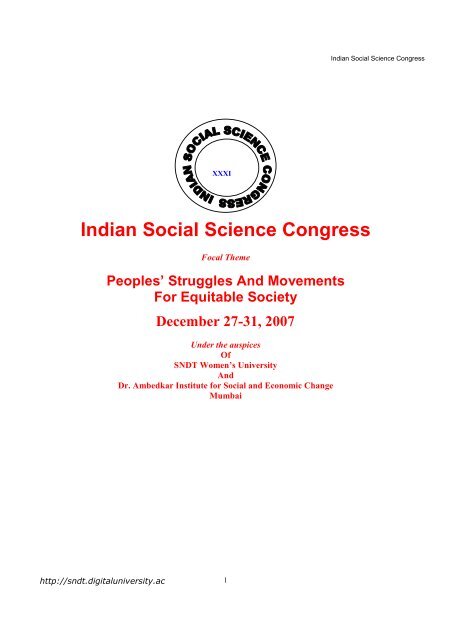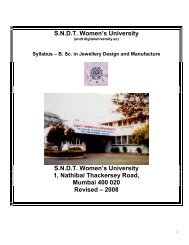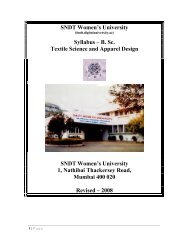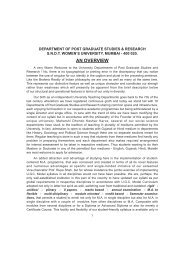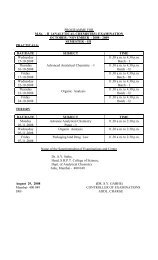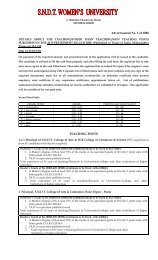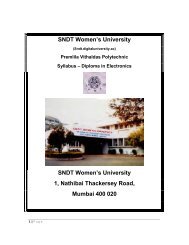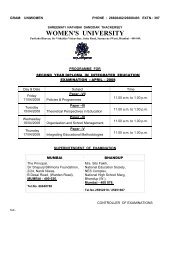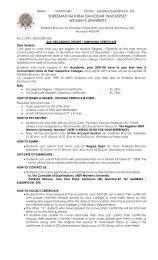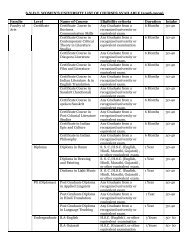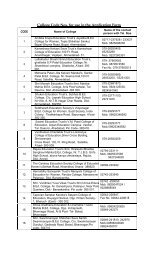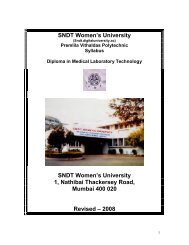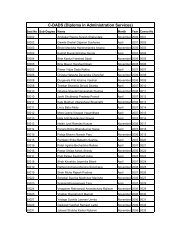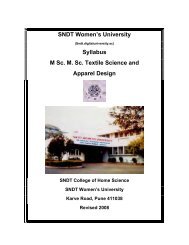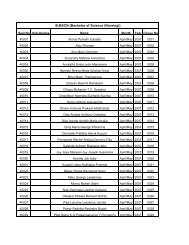Indian Social Science Congress - Shreemati Nathibai Damodar ...
Indian Social Science Congress - Shreemati Nathibai Damodar ...
Indian Social Science Congress - Shreemati Nathibai Damodar ...
Create successful ePaper yourself
Turn your PDF publications into a flip-book with our unique Google optimized e-Paper software.
<strong>Indian</strong> <strong>Social</strong> <strong>Science</strong> <strong>Congress</strong>XXXI<strong>Indian</strong> <strong>Social</strong> <strong>Science</strong> <strong>Congress</strong>Focal ThemePeoples’ Struggles And MovementsFor Equitable SocietyDecember 27-31, 2007Under the auspicesOfSNDT Women’s UniversityAndDr. Ambedkar Institute for <strong>Social</strong> and Economic ChangeMumbaihttp://sndt.digitaluniversity.ac 1
XXXIINDIAN SOCIAL SCIENCE CONGRESS<strong>Indian</strong> <strong>Social</strong> <strong>Science</strong> <strong>Congress</strong>DECEMBER 27-31, 2007SNDT WOMEN’S UNIVERSITYMUMBAIXXXIINDIAN ACADEMY OF SOCIAL SCIENCESPresident: Dr. Bhalchandra Mungekar<strong>Indian</strong> Academy of <strong>Social</strong> <strong>Science</strong>sMember, Planning Commission,Yojana Bhavan, New Delhi-110001Tel: 011-23096622(O; 011-23073663(R)Fax: 011-23096622E-mail: b.mungekar@nic.inPresident-elect: Sri S.P. Shukla, IAS<strong>Indian</strong> Academy of <strong>Social</strong> <strong>Science</strong>s3260, Sector D, Vasant Kunj,New Delhi 110070Tel: 011-26867089E-mail: manjuspshukla@gmail.comVice-President: Prof. Arun Kumar<strong>Indian</strong> Academy of <strong>Social</strong> <strong>Science</strong>s18, Dakshinapuram,Jawaharlal Nehru UniversityNew Delhi 110067Tel: (R) 011- 26742029, 26741587E-mail arunkumar1000@hotmail.comVice-President: Prof. Meher H. Engineer<strong>Indian</strong> Academy of <strong>Social</strong> <strong>Science</strong>s<strong>Indian</strong> Academy of <strong>Social</strong> <strong>Science</strong>sBose Institute of Physics,93/1, A.P.C. RoadKolkata-700009Tel: 033-22286089Treasurer:E-mail: mengineer2003@yahoo.comDr. R. N. Singh<strong>Indian</strong> Academy of <strong>Social</strong> <strong>Science</strong>sC-11, Govindpur,Allahabad (U. P.)Tel: 0532-2540770, M: 0-9415703694General Secretary: Dr. N.P. Chaubey<strong>Indian</strong> Academy of <strong>Social</strong> <strong>Science</strong>sIswar Saran Ashram CampusAllahabad 211004, IndiaTel: (O) 0532-2544245Telefax: 0532-2544170E-mail: issa@sancharnet.inissaald@gmail.comWebsite: http://www.issaindia.inORGANISING COMMITTEEChairperson Prof. Chandra KrishnamurthyVice-Chancellor,SNDT Women’s University1, N. Thackersey RoadMumbai-400020 (Maharashtra)Tel: 022-22031881, M: 0-9820966324E-mail: vcsndt@sndt.ac.inWebsite: www.sndt.ac.inCo-chairperson: Sri Ram S. TarnejaCo-ChairmanOrganising CommitteeVice-PresidentBhimrao Ambedkar Institute For <strong>Social</strong> And Economic Change,4, Pashmina, 33A, Pedder Road,Mumbai-400026E-mail: ram_tarneja@jollyboard.comTel: 23520722, 22020773Local Secretary: Dr (Mrs) Madhu Madan,XXXI <strong>Indian</strong> <strong>Social</strong> <strong>Science</strong> <strong>Congress</strong>Registrar, SNDT Women’s University,1, <strong>Nathibai</strong> Thackersey Road,Mumbai 400 020Tel: (O) 022-22004810/22031879;(R) 02226393971; M: 09820145492,Fax: 022-22018226;E-mail: registrar@sndt.ac.inWebsite: www.sndt.ac.inCoordinator: Prof. Vibhuti PatelDirector,Department of Post Graduate & Research, 6 th Flor, Patkar Hall building,Prof.&Head, PG Department of Economics,4 th Floor, Annex Building,SNDT Women’s University,Smt. <strong>Nathibai</strong> Road Churchgate,Mumbai-400020,M: 9321040048,E-mail: vibhuti.np@gmail.comIMPORTANT DATES TO REMEMBERLAST DATE FOR SUBMISSION OF ABSTRACTS: October 15, 2007LAST DATE FOR SUBMISSION OF PAPERS: November 15, 2007LAST DATE FOR REGISTRATION WITHOUT LATE FEE: November 15, 2007LAST DATE FOR BOOKING OF HOSTEL ACCOMMODATION: November 15, 2007No Paper shall be received after December 15, 2007. All accepted papers would be put on Website byDecember 22, 2007. Only Registered Delegates shall be provided free Accommodation and free food. Details ofallotment of accommodation shall be put on website by December 22, 2007.Websites: ISSA Website: http://www.issaindia.inSNDT Website: www.sndt.ac.in, http://sndt.digitaluniversity.achttp://sndt.digitaluniversity.ac 2
<strong>Indian</strong> <strong>Social</strong> <strong>Science</strong> <strong>Congress</strong>XXXI INDIAN SOCIAL SCIENCE CONGRESS(December 27-31, 2007, SNDT Women’s University, Mumbai)XXXIFOCAL THEMEPEOPLE’S STRUGGLES AND MOVEMENTS FOR EQUITABLESOCIETYDr. Bhalchandra Mungekar(Member, Planning Commission)PresidentToAll Vice-chancellor/Directors/Principals/Heads of Departments/Members/Heads of Peoples OrganisationsSub: Invitation From the PresidentDear Sir/Madam,INDIAN ACADEMY OF SOCIAL SCIENCESRegd HQ: Iswar Saran Ashram Campus, Allahabad-211004August 28, 2007I am happy to extend a very warm and cordial invitation to you and your colleagues to the 31 st Session ofthe <strong>Indian</strong> <strong>Social</strong> <strong>Science</strong> <strong>Congress</strong>, which is scheduled to be held under the auspices of the SNDT Women’sUniversity, Mumbai jointly with Dr. Ambedkar Institute for <strong>Social</strong> and Economic Change during December 27-31,2007 at Mumbai. ‘Peoples’ Struggles and Movements for Equitable Society’ has been chosen the Focal Theme forthe <strong>Congress</strong>. 26 Intradisciplinary and 34 Multidisciplinary Thematic Research Committees shall be deliberatingupon the theme. Besides, urgent contemporary issues such as global warming, and climatic change, paradigm ofmal-development etc also shall be deliberated upon during the <strong>Congress</strong>.Can science help create an equitable society- a society free from economic, political, social and culturalinequalities; a society free from violation of human rights; a society free from violence and weapons of massdestruction; a society in perfect harmony with nature? This is a challenge to modern science and scientists.The <strong>Indian</strong> Academy of <strong>Social</strong> <strong>Science</strong>s calls upon all our scientists to discover, develop anddisseminate a new scientific knowledge for establishing an equitable society.The <strong>Indian</strong> <strong>Social</strong> <strong>Science</strong> <strong>Congress</strong> is open for research scientists and teachers from all branches ofscience. It is also open for policy makers, planners, academicians, intellectuals, social activists and for all whoare deeply concerned with the <strong>Science</strong> of Nature-Man-Society. I would, therefore, request you to bring it to thenotice of your colleagues and students of all Departments and disciplines and encourage them to participate inthe deliberations of the XXXI <strong>Indian</strong> <strong>Social</strong> <strong>Science</strong> <strong>Congress</strong>. We shall be happy to welcome a large contingentof scholars and students from your organisation.Looking forward to a pleasant meeting,Yours sincerely,B. MungekarPresidentMailing Address: Member, Planning Commssion, Yojana Bhavan, New Delhi-110001,Tel: 011-23096622 Fax: 011-23073663E-mail: b.mungekar@yojana.nic.inhttp://sndt.digitaluniversity.ac 3
<strong>Indian</strong> <strong>Social</strong> <strong>Science</strong> <strong>Congress</strong>XXXIXXXI INDIAN SOCIAL SCIENCE CONGRESS01 PREAMBLEThe <strong>Indian</strong> Academy of <strong>Social</strong> <strong>Science</strong>s (ISSA) shall hold 31 st session of the <strong>Indian</strong> <strong>Social</strong> <strong>Science</strong> <strong>Congress</strong>(ISSC) under the auspices of SNDT Women’s University and Bhimarao Ambedkar Institute of <strong>Social</strong> And EconomicChange between December 27 and 31, 2007 with a view to discovering, developing and disseminating science of Nature-Man-Society in <strong>Indian</strong> conditions in particular, and world conditions in general, which is capable of creating a newdemocratic world where all men, women and children enjoy higher quality of material, social, cultural, spiritual and healthylife without fear of discrimination, oppression and exploitation while living in peace and harmony with Nature and Society.02 THE INDIAN SOCIAL SCIENCE CONGRESSSince science as an objective knowledge of living and non-living things, is social, <strong>Indian</strong> <strong>Social</strong> <strong>Science</strong><strong>Congress</strong> strives to bring all branches of science together under its umbrella with a view to building science ofNature-Man-Society in <strong>Indian</strong> conditions in particular, and in world conditions in general. All branches ofscience – social, historical, philosophical, linguistics, juridical, physical, chemical, biological, mathematical,ecological, environmental, medical, health, agricultural, engineering, biotechnological, computer andinformation technological are represented through 26 Intradisciplinary and 34 Multidisciplinary ThematicResearch Committees in it. Since there is no scientific literature in <strong>Indian</strong> languages even after 60 years ofIndia’s independence which has telling effect on the quality of science education and research in our country,the <strong>Indian</strong> <strong>Social</strong> <strong>Science</strong> <strong>Congress</strong> strives to produce scientific literature in forms of monographs, books andproceedings in all <strong>Indian</strong> languages. Building bridges between universities/colleges/institutes/laboratories andpeoples and the society is another vital object of the ISSC.First <strong>Indian</strong> <strong>Social</strong> science <strong>Congress</strong> was held in February 1976 at Allahabad. Since then it has been held everyyear regularly. So far 30 sessions of it have been held in different parts of India and the 31 st session is scheduled to beheld in December 27-31, 2007 at Mumbai. Details of all the previous sessions are given on page 57. The UniversityGrants Commission recognizes <strong>Indian</strong> <strong>Social</strong> <strong>Science</strong> <strong>Congress</strong> on par with <strong>Indian</strong> <strong>Science</strong> <strong>Congress</strong>. All the creativeminds find <strong>Indian</strong> <strong>Social</strong> <strong>Science</strong> <strong>Congress</strong> as a most creative and stimulating national forum of science for creative anddemocratic interactions, exchanges, dialogues and discourses on all scientific issues of theoretical and methodologicalsignificance.Each session of ISSC has a focal theme and numerous other themes. A National Academic Planning Committee(NAPC) comprising the eminent scientists, social activists, policy planners, Vice-chancellors and Directors steers theformulation of details of the focal theme and academic programmes. A Task Force appraises and integrates thedeliberations. Numerous pre-and-post ISSC local, regional and nationals symposia, seminars, colloquia are heldthroughout the year. Quite a large number of universities, colleges and institutes are actively involved in it.03 FOCAL THEMESince the People of India are celebrating 2007 as the 150 years of their struggles and movements forfreedom/independence since 1857, the <strong>Indian</strong> Academy of <strong>Social</strong> <strong>Science</strong>s has resolved to focus the deliberations of the31 st session of the <strong>Indian</strong> <strong>Social</strong> <strong>Science</strong> <strong>Congress</strong> on ‘Peoples’ Struggles And Movements For Equitable Society’. Anote on ‘Peoples’ Struggles And Movements For Equitable Society’ prepared by the National Academic PlanningCommittee (NAPC) is given on page 10 for reference to all those who wish to write and participate in the 31 st <strong>Indian</strong> <strong>Social</strong>science <strong>Congress</strong>. There shall be several plenaries, intradisciplinary, intradisciplinary and multidisciplinary,http://sndt.digitaluniversity.ac 4
<strong>Indian</strong> <strong>Social</strong> <strong>Science</strong> <strong>Congress</strong>symposia/seminars/colloquia Special Lecturers prior to, during and after the 31 st <strong>Indian</strong> <strong>Social</strong> <strong>Science</strong> <strong>Congress</strong>. Theensuing pages provide the thematic details of it.04 PLENARY THEMESIt is proposed to hold following plenaries on ‘Peoples’ Struggles And Movements For Equitable Society’ during the31 st <strong>Indian</strong> <strong>Social</strong> <strong>Science</strong> <strong>Congress</strong>:1. Peoples’ Struggles and Movements For Economic Equality2. Peoples’ Struggles and Movements For Democracy and full Civil Liberties / Human Rights.3. Peoples’ <strong>Science</strong> & Technology Movements for Alternate / New Paradigm of <strong>Science</strong> & Technology forEquitable Society.4. Peoples’ Struggles and Movements for Gender/ Racial/ Caste-discrimination-free Equitable Society.5. Peoples’ Struggles and Movements for Pollution – Free Harmonious Ecological Society / Ecological <strong>Social</strong>System/Environmental Equity.6. Peoples’ Struggles and Movements for a New Democratic and Scientific System of Education for All/CommonSchool/Non-Commercial Education..7. Peoples’ Struggles and Movements for Health Education and Health Care for All.8. Peoples’ Struggles and Movements for Mass Destruction Weapon-Free and Violence – Free Equitable Society.9. Redefining the Peoples’ Struggles and Movements for Equitable Society/Novel Ideas & Models ofMovements Equitable Society.05 INTRADISCIPLINARY RESEARCH COMMITTEESThere are 26 Intradisciplinary Research Committees in the <strong>Indian</strong> Socizl science <strong>Congress</strong>. EachCommittee has a chairperson, a co-chairperson, a convener, a co-convener and 15-25 members from all overIndia. (see page 13-18) Each Research Committee is expected (a) to undertake appraisal and integration ofcurrent research and theory within it; ((b) to strive to discover, develop and disseminate new theory and method;(c) to evolve new methods and theory for improving teaching and research in universities, colleges and researchinstitutes and (d) to undertake preparation and publication of good monographs and books in all <strong>Indian</strong>languages for improving the quality of science education and research through <strong>Indian</strong> languages. TheCommittee functions through correspondence and meets once in a year during the <strong>Indian</strong> <strong>Social</strong> <strong>Science</strong><strong>Congress</strong>.Each Research Committee has two kinds of academic programmes during the <strong>Indian</strong> <strong>Social</strong> <strong>Science</strong><strong>Congress</strong>. These are: one, symposia/seminars/colloquia/special lectures on some aspects of the focal theme oron the theme chosen by the given RC. Two, research papers received from the research scientists. All theresearch scientists doing research on issues and areas of their concern are welcome to present their papers at theISSC. The details of all the 26 RCs and proposed sub-themes of the focal theme, ‘Peoples’ Struggles AndMovements For Equitable Society’ are given below:01. Agricultural <strong>Science</strong> Research Committee: Peoples’ Agrarian Struggles and Movements For Equitable AgrarianRelations and Policies/Movements Against Special Economic Zones/Terminator Gene Seeds/Agribusiness/OrganicFarming, Cooperative Farming02. Anthropology Research Committee: Peoples’ Struggles And Movements for Unity of Man-Society-Nature/Peoples’Struggles And Movements For Preservation And Flowering of Their Identities and Culture/Tribal Peoples’ StrugglesAnd Movements For Equitable Society/Indigenous peoples’ struggles and movements.03. Biomedical <strong>Science</strong>, <strong>Social</strong> Medicine and Community Health Research Committee: Peoples’Struggles and Movements for a New Market Free Health <strong>Science</strong> Education and Health Care forAll/Rational and Low Cost Drugs/Medical Ethics.04. Biotechnology Research Committee: <strong>Social</strong> Applications And Ethics of Biotechnology.Peoples’-Friendly Biotechnology/Market-free Biotechnology.05. Commerce Research Committee: Peoples’ Struggles and Movements against unfair trade andcommercial practices including WTO, IPR etc.http://sndt.digitaluniversity.ac 5
http://sndt.digitaluniversity.ac 6<strong>Indian</strong> <strong>Social</strong> <strong>Science</strong> <strong>Congress</strong>06. Communication and Journalism Research Committee: Peoples’ Struggles and MovementsFor Corporate Control-free science-based mass media-communication. Peoples Media ForEquitable Society.07. Computer <strong>Science</strong> and Information Technology Research Committee: Peoples’ Strugglesand Movements against Digital Divide and for free hardware and software InformationTechnology.08. Defence and Strategic Studies Research Committee: Peoples’ Struggles And Movements for AViolence-free Democratic Defence Strategy/Pugwash/Disarmament/ Mass Weapon DestructionFree World. Toward A New Theory of Defence of the Equitable Society.09. Ecology And Environmental <strong>Science</strong> Research Committee: Peoples’ Struggles andMovements for Ecological and Environmental Equality Protection/Chipko/Silent Valley/GreenHouse Movements. New Ecosystem of the Equitable Society.10. Economics Research Committee: Peoples’ Struggles and Movements For EconomicEquality/Full Employment, Reduction of Disparity, Removal of Poverty, Privatization of Peoples’Property and Public Production System. New Political Economy of the Equitable Society.11. Education Research Committee: Peoples’ Struggles and Movements For Democratic ScientificEducation for All/Common School/Free Education.12. Geography Research Committee: Spatial Pattern & Analysis of Peoples’ Struggles andMovements for an Equitable <strong>Social</strong> Order in the World in General and in India in Particular.Peoples’ Struggles And Movements for Community Management of Land, Forest and Mines.13. History, Archaeology and Culture Research Committee: History of Peoples’ Struggles andMovements for a Equitable and Just Society/History of <strong>Indian</strong> Peoples Struggle And Movementssince 1957. Comprehending the Contemporary Historical Processes of Peoples Struggles AndMovements For Equitable Society.14. Home <strong>Science</strong> Research Committee: Peoples’s Struggles and Movements for Nutrition, Healthand Quality of Life, Family In the Equitable Society. The concept of happy home Peoples’movements for protection of children.15. International Relations Research Committee: Peoples’ Struggles and Movements forDomination-free Democratic International Relations. Peoples’ Struggles And Movements AgainstImperialism/Colonialism. Peoples’ Sruggles & Movements for House.16. Juridical <strong>Science</strong> (Law): Peoples’ Struggles and Movements for Justice to All. New DemocraticJurisprudence of the Equitable Society.17. Linguistics Research Committee: Peoples’ Struggles And Movements for flowering of theirlanguages/Equal Opportunities for Growth of All Languages.18. Management <strong>Science</strong> Research Committee: Peoples’ Struggles and Movements for EquitableShare in Production and Distribution/A New Paradigm of People-Oriented or Peoples’-Management <strong>Science</strong> of the Equitable Society.19. Philosophy Research Committee: Philosophy of Peoples’ Struggles and Movements ForEquitable Society/Peoples’ Movements against increasing Immorality and Unethical practices inthe Society.20. Political <strong>Science</strong> Research Committee: Peoples’ Struggles and Movements For TheirSovereignty; Peoples’ Struggles And Movements For Civil Liberties And Human Rights; Peoples’Struggles and Movements for a Democratic Society. Nature And role of State in Formation ofEquitable Society. Nature of State in The Equitable Society.21. Population <strong>Science</strong> Research Committee: Peoples’ Struggles And Movements for HigherQuality of Life/Peoples’ Movements Against Infant Mortality and Morbidity.22. Psychology Research Committee: Psychology of Peoples’ Struggles and Movements ForEquitable Society: From Psychology of Domination/Competition to Psychology of Cooperation/Psychologyof Democratic Needs and Aspirations of Peoples’ Struggles AndMovements, Psychology Equality.
<strong>Indian</strong> <strong>Social</strong> <strong>Science</strong> <strong>Congress</strong>23. <strong>Science</strong> & Technology Policy Research Committee: Peoples’ <strong>Science</strong> Movements For A NewDemocratic <strong>Science</strong> Policy: From Market-oriented <strong>Science</strong> & Technology to Peoples’- oriented<strong>Science</strong>/<strong>Science</strong> of Global Warming/The Planet Earth, Peoples, Society and <strong>Science</strong>..24. <strong>Social</strong> Works Research Committee: <strong>Social</strong> Work For The Equitable Society/Principles of Non-Governmental Organisations’ – led Peoples’ Movements/Redefining The Roles of <strong>Social</strong> Work InPeoples Struggles And Movements For Equitable Society. <strong>Social</strong> Engineering of EquitableSociety.25. Sociology Research Committee: Sociology of Peoples’ Struggles and Movements For EquitableSociety.26. Statistics & Mathematics Research Committee: Quantifying And Measuring the Peoples’Struggles and Movements/underlying pattern in Peoples’. Movements For Equitable Society.Making Mathematics Popular.06 MULTIDISCIPLINARY THEMATIC RESEARCH COMMITTEESThere are 34 Multidisciplinary Thematic Research Committee in the <strong>Indian</strong> <strong>Social</strong> science <strong>Congress</strong>.Each of these have a chairperson or Convener and 10-15 members. Scientists of different disciplines doingresearch on the common theme are encouraged to engage in interactive exchanges and communication with aview to discovering common language, common method and common theory (see pp 19-23). The details of allthe 34 Multidisciplinary Thematic Research Committees are as follows:CODEMULTIDISCIPLINARY THEMATIC RESEARCH COMMITTEES1. The Political Economy of India2. Peasants, Agriculture, Technology & Market Forces3. Survival and Growth of Small Industries and Small Producers4. Global Capital, Multinational Corporation And Industrial Development5. Democracy And Human Rights in Today’s Global World6. State, Society And Peoples7. Democratic Politics, Political Parties and Democratic Political Institutions8. Ecological And Environmental Protection Studies And Movements9. Global Market Forces, <strong>Social</strong> Policies, Welfare Programmes And <strong>Social</strong> Justice10. Education, Skill Formation And Utilization11. Creativity, Innovations And Discoveries12. <strong>Social</strong> Processes And <strong>Social</strong> Structures In Globalised World13. Peoples' Health and Quality of Life in Globalised World14. Peoples’ Liberation Struggles And Movements For New Democratic Discrimination –Free World Order(Dalits, Tribals, Women, Peasants, etc.)15. Socio-Economic-Linguistics, Communal Conflicts And Violence16. Information Technology, Mass Media And Culture17. <strong>Social</strong> Alienation of Modern Man18. Development of <strong>Indian</strong> Languages, Linguistic Unity And Diversity19. Cultural Heritage: Archaeological Excavations and Preservation of Historical Monuments20. Population, Poverty And Migration In Global World21. Labour In Organized And Unorganized Sectors of Global Economy22. Diffusion, Propagation And Communication of <strong>Science</strong>23. Natural Resources, Bio-diversity And Geographic Information System24. Patent Laws And Intellectual Property Rights25. World Organizations, World Trade and Commerce (UNO, UNDP, UNESCO, UNICEF, WHO, G-8, G-15,Regional Groups, WTO etc)26. Conflicts, War, Peace And <strong>Social</strong> Security In Globalised World27. <strong>Science</strong>, Technology And Peoples Development28. Nation-States And Emerging Challenges29. Imperialism, Colonialism, Neo-colonialism And Uni-polar World30. Unity of Knowledge (<strong>Science</strong> of Man-Society-Nature)31. <strong>Social</strong> Theory of Change And Developmenthttp://sndt.digitaluniversity.ac 7
<strong>Indian</strong> <strong>Social</strong> <strong>Science</strong> <strong>Congress</strong>32. Evolution of Man And Society33. Rural Technology, <strong>Social</strong> Organisation And Rural Development34. Problematique of Democratic Governance in Globalised World07 SPECIAL SEMINARS/SYMPOSIA/AD HOC GROUP DISCUSSIONSIt is proposed to hold national/international seminars/symposia/ colloquia as following issues:(a) National Seminars/Symposia Themes:1. <strong>Indian</strong> Peoples’ Struggles And Movements For Equitable Society2. Dalit Peoples’ Struggles And Movements For Equitable Society.3. Women’s Struggles And Movements for Gender-Discrimination-Free Equitable Society.4. Peoples’ Struggles and Movements for Secular Society.5. Peoples’ <strong>Science</strong> Movements For Equitable Society.6. Peasants’ Struggles And Movements for Equitable Society.7.Youths’ Movements And Struggles For Equitable Society (Second All India Young Scientists Convention).8. Peoples’ Struggles And Movements For Rights For Information.(b) International Seminars/Symposia Themes:1. Peoples’ Liberation Struggles and Movements Across the World (Asia, Africa and Latin America) forEquitable Society.2. International Working Peoples/Trade Union Struggles And Movements For Equitable Society.3. International Peoples Movements for Protection of Rights of Children.(c) Special Symposia/Colloquia:Special Symposia/Colloquia will be held on following issues during the ISSC.1. The Planet Earth: Peoples, Society And <strong>Science</strong>.2. The <strong>Science</strong> of Global Warming.3. From The Paradigm of Mal-Development To The Paradigm of Peoples’ Development.4. The Socio-economic Implications of Special Economic Zones.(see pp 25-28 for details)Besides, research scientists/social activists/policy planners desirous of organizing small group discussions onthemes of their concern are welcome to send their proposals under ‘Ad Hoc Group Discussions’. Time isallotted for such discussions during post-dinner session between 2100 and 2330 hours. The proposer shallundertake the responsibility of planning and organizing such discussions. There ought to be atleast 5participants.08 PUBLIC LECTURESThe <strong>Indian</strong> Academy of <strong>Social</strong> <strong>Science</strong>s organizes public lectures by eminent scientists, social activists, policy planners andeducationists prior to, during and after the <strong>Indian</strong> <strong>Social</strong> <strong>Science</strong> <strong>Congress</strong> within a view to communicating science to the people. Suchlectures are held in the evening hour during the <strong>Indian</strong> <strong>Social</strong> <strong>Science</strong> <strong>Congress</strong>.09 TASK FORCEA Task Force set up by the Executive Council of the ISSA deliberates over the deliberations of the<strong>Indian</strong> <strong>Social</strong> <strong>Science</strong> <strong>Congress</strong> with a view to discovering newer ideas/theories and methods emerging at it. Itprepares its recommendations in form of a Trend Report which is further deliberated over by the delegatesbefore finalization.10 EXHIBITIONIt is proposed to organize books and posters exhibition during the XXXI <strong>Indian</strong> <strong>Social</strong> <strong>Science</strong> <strong>Congress</strong>.Posters/Films/Audio-Visuals/Books on various aspects of ‘Peoples Struggles And Movements’ in their historicalperspective can be put on display. Those wishing to participation in the Exhibition are advised to contact the Localhttp://sndt.digitaluniversity.ac 8
<strong>Indian</strong> <strong>Social</strong> <strong>Science</strong> <strong>Congress</strong>Non-registered scholars shall be required to buy the food coupon from the counter. No certificate shall be issuedto non-registered scholars or scholars who have registered without submitting any papers.The Registered delegate is entitled to receive all publications of the XXXI <strong>Indian</strong> <strong>Social</strong> <strong>Science</strong> <strong>Congress</strong>including its proceedings free of cost, free hostel accommodation, free meals, free transport from Railway station to theplace of accommodation at SNDT Women’s University, Mumbai and from hostel to the venue, banquets and culturalprogrammes. However, delegates staying in hotels or on their own shall not be entitled for free transport. Local registereddelegates will be entitled for kitbags, free lunch, day tea/coffee and banquets only. Free Breakfast, lunch, day tea anddinner will be available to registered delegates with effect from morning of December 27 to the evening of December 31,2007 only.The registration fee should be sent to the General Secretary, <strong>Indian</strong> Academy of <strong>Social</strong> <strong>Science</strong>s by anaccount payee DD in favour of <strong>Indian</strong> Academy of <strong>Social</strong> sciences payable at Allahabad under registered cover.Outstation cheque or money order will not be entertained.Although on the spot registration will be made, yet the Organizing Committee is not bound to providehostel accommodation to such delegates if the accommodation is not available. It is, therefore, advisable to getregistered within the stipulated time in order to avoid last minutes inconvenience.The invited scholars and members of the Executive Council, Organising Committee and other bodies andspecial invitees are advised to pay the registration fee within the stipulated time and claim its reimbursementalong with or without their TA bills as intimated by the General Secretary, <strong>Indian</strong> Academy of <strong>Social</strong> <strong>Science</strong>s.Refund of the registration fee will be made after deducting 40% as the service charges if the request for it isreceived before December 15, 2007. Literature of the XXXI ISSC, however, shall not be supplied in such cases. Thosewho have registered but are not able to attend the XXXI ISSC because of unavoidable reasons would be supplied all thepublications if their request for refund is not received or if they do not wish refund.In the event of more than one author of a paper, all will be required to pay the registration fee individually.16 TRAVELAll the research scientists, teachers students, social activists and policy planners intending to attend XXXI <strong>Indian</strong> <strong>Social</strong><strong>Science</strong> <strong>Congress</strong> are advised to seek travel support from their respective organizations. However, a few such scholars who have noorganizational support and whose research papers are adjudged as of quite high standard or who have been invited to deliverplenary/public/special lectures may be provided either full or partial financial support by ISSA and SNDT Women’s Universitydepending upon availability of funds. Such scholars are advised to write to the General Secretary, <strong>Indian</strong> Academy of <strong>Social</strong> <strong>Science</strong>salong with their papers before November 15, 2007. No on the spot request for financial support shall be entertained. Since the positionof funds is known only around the dates of the ISSC, no commitment is possible well in advance. So the scholars applying for travelsupport are advised to make necessary arrangement on their own well in time. This, however, will not apply to invitedscholars/resource persons. The General Secretary shall intimate the decision of the appropriate committee on the request for travelsupport before December 10, 2007 if the position of funds are known by then.17 ACCOMMODATIONThe SNDT Women’s University shall provide Guest House/Hostel accommodation to the registered scholars attending XXXIISSC free of charge on receipt of request before November 15, 2007. Most of the accommodations will be double-bedded rooms.Those who wish to stay in hotels are advised to make their own arrangements. Local Secretary shall help such scholars in hotelreservation provided one-day room rent is sent to her by a DD in favour of Local Secretary, XXXI <strong>Indian</strong> <strong>Social</strong> <strong>Science</strong> <strong>Congress</strong>payable at SNDT Women’s University, Mumbai. Hotel tariff is given on page 46.All the scholars are advised to carry light clothes and mosquito nets or repellants. Guest House/Hostel accommodation willbe available from the afternoon of December 26, 2007 to the night of December 31, 2007 free of charge. Those wishing to haveaccommodation before the afternoon of December 26, 2007 are advised to request the Local Secretary well in advance and pay therent as intimated by her. All are advised to send filled-in Accommodation Form to the Local Secretary before November 15,2007.18 TRANSPORTThe Organising Committee will provide transport from the Railway Station/Bus Station/Airport at Mumbai to the place ofaccommodation and from Hostel to the venue of the XXXI <strong>Indian</strong> <strong>Social</strong> <strong>Science</strong> <strong>Congress</strong> free of cost. However, no suchhttp://sndt.digitaluniversity.ac 10
<strong>Indian</strong> <strong>Social</strong> <strong>Science</strong> <strong>Congress</strong>Details of Chairpersons/Co-chairpersons/Conveners/Co-conveners of 26 Intradisciplinary ResearchCommittees, 34 Multidisciplinary Thematic Research Committees and special seminars/ symposia are given onnext pages. Interested scholars are advised to contact with the chairperson/co-chairpersons of their concern.24. WEBSITEPlease visit our website: www.issaindia.in or www.sndt.ac.in or http://sndt.digitaluniversity.ac for furtherdetails of the XXXI <strong>Indian</strong> <strong>Social</strong> <strong>Science</strong> <strong>Congress</strong>. It is proposed to put the abstracts of all accepted papers onour website by December 22, 2007.http://sndt.digitaluniversity.ac 12
<strong>Indian</strong> <strong>Social</strong> <strong>Science</strong> <strong>Congress</strong>01 PREAMBLEXXXI INDIAN SOCIAL SCIENCE CONGRESSA NOTE ONPEOPLES' STRUGGLES AND MOVEMENTS FOR EQUITABLE SOCIETY<strong>Indian</strong> Academy of <strong>Social</strong> <strong>Science</strong>s (ISSA) has resolved to devote the 31st session of <strong>Indian</strong> <strong>Social</strong> <strong>Science</strong><strong>Congress</strong> (XXXI ISSC) on ‘Peoples’ Struggles And Movements For Equitable Society’ with a view to discovering,developing and disseminating a new scientific knowledge relevant to creating a new democratic global society free fromhunger, poverty, literacy, unemployment and violence of any sort and where all men, women and children would be ableto enjoy equally higher quality of life and live in tranquility and harmony with Nature and Society.02 CONTEXTThe 30th <strong>Indian</strong> <strong>Social</strong> <strong>Science</strong> <strong>Congress</strong> held in December 27-31, 2006 at Algappa University,Karaikudi spent a considerable amount of time on discussing the nature of the contemporary world order, whichhas emerged in the recent years in the context of some of the most cherished values such as democracy, justiceand equality. • At the end, a broad consensus on the following three issues, among others, emerged.First, the already highly unequal societies are becoming even more unequal under the new global order. Thereare several ways in which this process is taking place. By and large, economic inequalities are increasing within nationsas well as among them. In many instances, the greater economic inequalities are getting interwoven with other kinds ofinequalities, particularly social inequalities of historical nature. Also, the character of some of these inequalities is gettingtransformed. In this context, it is important to note that although from a conceptual point of view there is a differencebetween inequality and inequity, they are at times closely connected. Quite often, it is the inequalities of one kind, likeinequalities of opportunities, which give rise to inequalities of other kinds, like exclusions. The merging of the two notionsof inequality and inequity takes place as a consequence of exclusions erroneously being perceived as actuated by somenotion of deservingness rather than being correctly perceived as caused by the inequalities existing in a different domain.Second, the newly emerging socio-economic order is inimical to the existence of individual rights in anymeaningful sense. This is evident in the case of economic and social rights; as it is difficult to see what meaning andsignificance can be attached to rights like the right to food, the right to education, and the right to health when the statehas withdrawn or is in the process of withdrawing from most welfare activities relating to the realization of these rights.Even the civil and political rights are under assault the world over; partly because of so-called `war on terror', and partlybecause of the overwhelming dominance of market. It is also a moot point as to what meaning is to be ascribed to thecollective right of self-determination under an international order where countries can be invaded and occupied at will. Inthis context, it is important to note that individual as well as the collective rights is necessary for the very existence of ademocratic society. The same is true with respect to the goal of establishing an equitable society. In this context it is alsoimportant to highlight that the new socio-economic structures, dominated by free and global markets, as also by themultilateral treaties are intrinsically inconsistent with the democratic ideals of autonomy and decentralization.Lastly, there was a consensus that in the present circumstances, only alternative to the regressive processof accentuation of inequalities is to create a countervailing power in the form of struggles and movements of thepeoples. The significance of peoples' movements is manifold. The first and foremost, the very act of launching amovement indicates rejection of a situation which is found wanting in some crucial respects. The articulation ofthe reason for the rejection of a situation, if taken to its logical end, would inevitably result in affirmation of asocial principle. Thus, regardless of the final outcome of a people's movement, `success' or `failure', it is likelyto change, to some degree, the contours, and possibly, the framework of the social discourse, as for theparticipants in such movements and struggles, often the changes are rather radical. This seeks to affect one's• ‘Toward A New Global Society’ was the focal theme of the 30 th session of <strong>Indian</strong> <strong>Social</strong> <strong>Science</strong> <strong>Congress</strong> which was held fromDecember 27 to 3, at Alagappa University, Karaikudi.http://sndt.digitaluniversity.ac 13
<strong>Indian</strong> <strong>Social</strong> <strong>Science</strong> <strong>Congress</strong>social consciousness which, in turn may have deep impact on one's ideas and actions in future. Therefore, evena short-lived people's movement may have powerful long-run implications. Seen in this perspective, a genuinepeople's movement is never a complete failure.As discussed above, while every genuine people's movement has transformative implications for both the socialconsciousness of the participants and the contours of social discourse, whether a movement would be able to bring aboutchanges in the social institutions depends on a complex set of factors; the most important of them being theappropriateness of the immediate goals in relation to the existing institutional structure. Of course, this point is relevantmainly with respect to non-revolutionary movements carried out through peaceful parliamentary means.If one accepts the viewpoint that the present socio-economic order is inconsistent with the ideals of democracy,justice and equality, then the importance of the movements cannot be overemphasized. It is for this reason that it hasbeen decided to have `Peoples' Struggles and Movements for Equitable Society' as the focal theme for the 31st <strong>Indian</strong><strong>Social</strong> <strong>Science</strong> <strong>Congress</strong>. It is hoped that apart from analyzing the contemporary peoples' movements from the correctperspectives, the <strong>Congress</strong> would also help initiate a long-term study of the peoples' movements from both theoretical andempirical perspectives.03 Peoples' Movements: Some Fundamental Conceptual QuestionsTo begin with, one has to address the question as to which movements can be classed as peoples'movements. It is obvious that not every movement can be called a people's movement. It would be ideal if onecould identify a set of characteristics, which would define a people's movement. In any case, for correct analysisof movements, the following issues appear relevant.(i)(ii)(iii)(iv)(v)Purpose of the movementArticulation of social principles during the course of the movementOrganization of the movementProgrammes and strategy of the movements/struggles.The impact of the movement on the society in terms of realization of its objectives.The character of a movement is partly determined by its goals, and partly by the social principles underlying thesegoals, the commitment of the participants of the movement; and the state, by being the main repository of coercive power.The characteristics relating to the organizational aspects of movements are particularly likely to be affected by the way thestate responds to movements.04 OBJECTIVESThe XXXI <strong>Indian</strong> <strong>Social</strong> <strong>Science</strong> <strong>Congress</strong>, therefore, proposes to deliberate upon the following issues:1. To appraise the Peoples’ current struggles and movements in India in particular, and in other parts of the world.2. To determine democratic strengths and weaknesses of peoples’ struggles and movements across the world3. To identify the features of an ideal democratic society for the future as the targeted objective of the on-going Peoples’struggles and movements.4. To determine the short-term and long-term concerns for equitable society as reflected in the on- going peoples’struggles and movements5. To explore and develop theoretical insights and praxis of Peoples’ struggles and movements for equitable society05 SCOPEThere is a very wide scope for scientific study of peoples’ struggles and movements within and outside thecountry. All local, regional, national and international peoples’ struggles and movements for the realization of variousgoals could be studied for the realization of various goals prior to, during and after 31 st <strong>Indian</strong> <strong>Social</strong> <strong>Science</strong> <strong>Congress</strong>.Since the historical and social processes play a vital role in peoples movements and struggles, the same need to bstudied in depth. It is quite likely that contemporary people’s struggles and movements may not be found strong enough tohelp create an equitable society. If this is the case, then how to make them strong and effective? This too needs beaddressed.http://sndt.digitaluniversity.ac 14
06 THE PROPOSED STRUCTURE OF THE CONGRESS AND OTHERPROGRAMMES<strong>Indian</strong> <strong>Social</strong> <strong>Science</strong> <strong>Congress</strong>It is proposed to discuss the focal theme in the <strong>Congress</strong> comprehensively. For this, the presentations, discussions and deliberations during the <strong>Congress</strong> areproposed to be organized under the following five categories:1. Plenary Sessions2. Sessions of Intra-Disciplinary Research Committees3. Sessions of Multidisciplinary Thematic Research Committees4. Symposia/Seminars/Colloquia5. Public LecturesPLENARY SESSIONSThe Plenary sessions shall be mainly devoted to discussing the important economic, social, political andecological issues in the context of the peoples' struggles and movements for an equitable society. It should, however, benoted that papers dealing with important economic, social, political and ecological issues, but not necessarily in thecontext of peoples’ movements, would also be welcome.XXXI INDIAN SOCIAL SCIENCE CONGRESSINTRADISCIPLINARY RESEARCH COMMITTEESTheme Chairman CochairmanAgricultural <strong>Science</strong>s Dr. N. RaveendaranDepartment of Planning &MonitoringTamil Nadu Agri. UniversityCoimbatore – 3Tel: 0422-26611310, 2431609M: 0-9843219606E-mail: raveendran@hotmail.comConvenerCo-convenerAnthropologyBiomedical <strong>Science</strong>,<strong>Social</strong> Medicine andCommunity HealthDr. Binod C. AgarwalDirectorTALEEM Research Foundation,AndVice-chancellorHimalyan Nabh Vishwa VidyalayCity Plaza, Sterling City, BopalAhmedabad 380058Tel: 0-9426301418E-mail: taleemad1@sancharnet.inDr. B. EkbalKuzhuvalil HouseArpookara East, Kottayam-686008(Kerala)Tel: 09447060912E-mail: ekbal@vsnl.comhttp://sndt.digitaluniversity.ac 15
BiotechnologyProf. Santosh KarCentral For Biotechnology,Jawaharlal Nehru University,New Delhi-110067Tel: 0-9910853399E-mail:santoshkariis@rediffmail.comDr. M.C. ArunanHead, Life <strong>Science</strong>Department, SophiaCollege, BullabhaiDesai RoadMumbai-400026Tel: 022-23512560®022- 23512642 (O)E-mail:mcarunan@gmail.com<strong>Indian</strong> <strong>Social</strong> <strong>Science</strong> <strong>Congress</strong>CommerceDr. S.S, KaptanHead, PG Dept of CommerceSNDT Women’s University1, Smt <strong>Nathibai</strong> Road,Mumbai-400020M: 9869558137E-mail: ss_kaptan@rediffmail.comDr. KalyaniVenkateshwaran,Dean, Faculty ofCommerceSNDT Women’sUniversity,1, N. ThackerseyRoadMumbai-400020M: 9820239330,022-24026626E-mail:kalyanivenkateswaran@yahoo.comDr. G.Y. Shitole,Reader, P.G.Department ofCommerce, SNDTWomen’s University,Mumbai-400020M: 0-9322247148E-mail:gshitole@rediffmail.comCommunication andJournalismProf. B.P. SanjayProfessor of CommunicationSarojani Naidu SchoolCentral University of Hyderabad,Gachhi BowliHyderabad 500046Tel: 040-23010909, M:09440696422E-mail: bpssn@uohyd.ernet.in,bpssm54@gmail.comDr. Radha MishraProf. & HeadDepartment ofCommunicationSNDT College ofHome <strong>Science</strong>Karve Road, Pune-411038Tel: 020-30286385Email:misra_radha@hotmail.comComputer <strong>Science</strong> &Information TechnologyDefence And StrategicStudiesDr. S.S. ManthaPro-Vice-ChancellorSNDT Women’s University,1, <strong>Nathibai</strong> Thackersey RoadMumbai-400020Tel: 0-98204439978E-mail: ssmantha@vjtl.org.inProf. R.P. YadavHeadDepartment of Defence & StrategicStudies,Deen Dayal Upadhyay GorakhpurUniversity,Gorakhpur (U.P.)Tel: 0551-2201044 M:09415313714E-mail: rprasad55@rediffmail.comProf. T.J. MathewProf & HeadDepartment ofComputer <strong>Science</strong>,SNDT Women’sUniversity, JuhuCampus, Santacruz(W)Mumbai-400029Tel: 022-26606607E-mail:mathewtj29@hotmail.com-Ecology & Environmental<strong>Science</strong>sProf. G.D. SharmaPro-Vice ChancellorAssam UniversitySilchar-788011Tel: 03842-270806,N:09435500660E-mail:sch_regau101@sancharnet.inhttp://sndt.digitaluniversity.ac 16Prof. Lalit PandeFormer Dean,School of Environ-Mental <strong>Science</strong>,Jawaharlal NehruUniversity,C-1/206, VasantKunjNew Delhi-116070Tel: 011-26122564
E-mail:lalit_pande@hotmail.com<strong>Indian</strong> <strong>Social</strong> <strong>Science</strong> <strong>Congress</strong>EconomicsEducationProf. Satish K. JainCentre for Economic Studies andPlanningSchool of <strong>Social</strong> <strong>Science</strong>sJawaharlal Nehru UniversityNew Delhi 110067(O) 011-26704443(R) 011-26171567M: 9868645515e-mail: skjo302@mail.jnu.ac.inProf. Furqan QamarHeadCentre for The ManagementStudies,Jamia Milia IslamiaJamia Nagar, New Delhi 110025Tel: 09810245019E-mail: furqanqamar@vsnl.netProf Vibhuti PatelDirector,Department ofEconomics AndEconomicsResearch Centre,SNDTWomen’sUnivesity,1, N. ThackerseyRoadMumbai-400020(Maharashtra)E-mail:vibhutinp@gmail.comDr. Harsha MerchantPrincipalPVDT College ofEducationSNDT Women’sUniversity1, <strong>Nathibai</strong>Thackrsey RoadMumbai-400020Tel: 022-28360706M: 09870106747E-mail:harsha_merchant@yahoo.co.inDr. Rajendra PrasadKunduEconomics DepartmentJadavpur University,JadavpurKolkata 700 032Email:rajendra.kundu@gmail.comDr. Rohini SudhakarReaderDept. of Continuingand Adult EducationSNDT Women’sUniversity1, <strong>Nathibai</strong> ThakerseyMargChurchgate, Mumbai-20Ph. No:-022-2363 557798690 13054Rohini_sudhakar@hotmail.comDr. Veena DevasthaliP.G. Department of EconomicsSNDT Women’s University, Smt<strong>Nathibai</strong> RoadChurchgate,Mumbai 400020 (MS)E-mail:veena.devasthhali@gmail.com,GeographyHistory, Archaeology andCultureProf. Jagdish SinghDepartment of GeographyBanaras Hindu UniversityVaranasi 221005Tel: 0542-2570928M: 0-9838461202E-mail: jsingh_1952@fify.comProf. Om PrakashVice-ChancellorRuhelkhand UniversityBareillyDr. R. G Patil,SNDT Women’sUniversityMaharishi KarveVidyaviharKarve Road, Pune-411038M. 09422352017Surekha SawantPrincipal, LJNJCollege of Arts &CommerceVille Parle (East)Mumbai-400057M.,09820346264E-mail:s4m2rsawant@rediffmail.comHome <strong>Science</strong>International RelationsDr. Shobha UdipyDirector, PGSRFaculty of Home <strong>Science</strong>,SNDT Women’s University, JuhuRoad, Santacruz (W),Mumbai-400049E-mail: reeta_123@hotmail.comProf. Girijesh PantSchool of International StudiesJawaharlal Nehru UniversityNew Delhi 110067Tel: 011-26171276http://sndt.digitaluniversity.ac 17Prof. Reeta SonawatDepartment of Home<strong>Science</strong>, SNDTWomen’s University,JuhuRoad,SantacruzWest (W) Mumbai-400020M: 0-9892367226E-mail:reeta_123@hotmail.comDr. V.S. SethProfessor,RetiredDepartmnt ofPolitical <strong>Science</strong>Dr. Sima BaidyaCentre For West Asian& African StudiesSchool of InternationalStudies-
Juridical <strong>Science</strong> (Law)LinguisticsM: 0-9810236871E-mail: gpant49@gmail.comDr. Kalpana Kannabiran128, Hanuman Temple RoadEast MarredpalliSecunderabad 500002 (A.P)Tel: 040-27733853M: 0-9849038920E-mail:kalpanakannabiran@gmail.comProf. R.K. AgnihotriDepartment of Linguistics,University of Delhi,Delhi-110007E-mail: agniirk@yahoo.comTel: 011-27483963M: 09811465134University BombayKalina Campus,VidyanagariMumbaiDr. Bindu VariathFaculty of LawSNDT Women’sUniversityII Floor, Patkar hallbuilding1, <strong>Nathibai</strong>Thackersey RoadMumbai-400020M: 0-986932997E-mail:binduvariath@rediffmial.comDr. Pratima DavePG Department ofSpecial Linguistics,1 Floor, Patkar HallBuilding,SNDT Women’sUniversity1,<strong>Nathibai</strong>Thackersey RoadMumbai-400020Tel: 022-26715191E-mail:pratima_shastri@yahoo.com-Jawaharlal NehruUniversity,New Delhi-110067M: 09971388652E-mail:sima.baidya@gmail.com-<strong>Indian</strong> <strong>Social</strong> <strong>Science</strong> <strong>Congress</strong>Dr. Anil VariathFaculty of LawSNDT Women’s UniversityII Floor, Patkar hall building1,<strong>Nathibai</strong> Thaxckersey Road,Mumbai-400020E-mail:binduvariath@rediffmail.com- Dr. Asha Patil,Department of Adult Continuing& Extn Education,1 Floor, Patkar Hall BldgSNDT Women’s University,MumbaiE-mail:asha_461@rediffmail.comManagement <strong>Science</strong>Prof. M. Ashraf RizviChairmanExecutive Education<strong>Indian</strong> Institute of ManagementIndorePigdamber, Rau,Indore 453331(M.P.)Mob. 0-9993347274E-mail: ashrafrizvi@iimidr.ac.inGulnar SharmaDirectorJanaki Devi BajajInstitute ofManagement,SNDT Women’sUniversity,VithaldasVidyavihar,Juhu Tara Road,Santacruz (W)Mumbai –400049Tel: 0-9833087649E-mail:drgulnarsharma@gmail.comPhilosophyProf. Satyapal GautamCentre For Philosophical Studies,School of <strong>Social</strong> <strong>Science</strong>s,Jawaharlal Nehru University,New Delhi-110067Tel: 011-26704580 (O)011-26101426 ®M: 0-98108813437E-mail: satyagautam@gmail.comPolitical <strong>Science</strong>Dr. Sneha PalnitkarDirector, All India Institute of Localself Government, MN. RoyCampus,Opp. Government Colony,Bandra (E) Mumbai-400098E-mail: snehapalnitkar@gmail.comhttp://sndt.digitaluniversity.ac 18Prof. SurendraJondlaleDepartment ofPolitical <strong>Science</strong>,Bombay University,Kalina Campus,VidyanagariB.B. PradhanPrincipal,SNDT College of Arts& SCB College ofCommerce & Home<strong>Science</strong> for Women1, <strong>Nathibai</strong> Thakersey
Population <strong>Science</strong>Prof. F. RamInternational Institute of Population<strong>Science</strong>sDeionar, ChemburMumbai 400088Tel: 0-9869440201e-mail: fram@irps.netMumbai-400098Dr. S.C. JhansiDepartmrnyt ofContinuing AdultEducation, SNDTWomen’s University,1, <strong>Nathibai</strong>Thackersey RoadMumbai-400020Tel: 0-9224685850E-mail:drscjhansi@yahoo.co.in<strong>Indian</strong> <strong>Social</strong> <strong>Science</strong> <strong>Congress</strong>MargChurchgate, Mumbai-20Ph. 022-2209 3789drpradhan@sndtwcollege.co.inPsychology<strong>Science</strong> And TechnologyPolicy StudiesProf. Mewa SinghProfessor of Psychology,University of Mysore,Mysore-570006M: 0-9448603506E-mail: mewasingh@sancharnet.inDr. A.K. BasuSociety for Rural Industrialization,New Area, MorabadiRanchi-834008 (Jharkhand)Tel: 0651-2551820M: 0-9431100650E-mail:rupcon@inranchi.comHarbans KialaDepartment ofPsychologySNDT Women’sUniversity1, <strong>Nathibai</strong>Thackersey RoadMumbai-400020M: 0-9322006518E-mail:kailahl@hotmail.comDr. T. JayaramanTata Institute of<strong>Social</strong> <strong>Science</strong>sDeonar, Mumbai-400 088Tel: 0-989222841E-mail:tjayaraman@gmail.comDr. PadakannayaPrakashProfessor &Coordinator for UGCInnovative Programmeon LDDepartment ofPsychology,University of Mysore,ManasagangotriMysore 570 006Tel: 91-821-2419743E-mail:prakashp99@yahoo.com<strong>Social</strong> WorkDr. Vandana Chakravarty,Head, PG Dept of <strong>Social</strong> WorkSNDT Women’s University,Juhu Road, Santaqruz (W),MumbaiTel: 022-22066892,M: 0-9324542353E-mail: dr.vandana@yahoo.comNandita MandalP.G. Department of<strong>Social</strong> Work, SNDTWomen’s University1, <strong>Nathibai</strong> ThackerseyRoadMumbai-400020SociologyDr. Vijay MarulkarHead, PG Department of SociologySNDT Women’s University,Churchgate Campus, Mumbai-20M: 0-9370655000E-mail: marulkar_sndt@yahoo.co.inProf. PrahaladJogdandDirector,Centre for AmbedkarStudies,Department ofSoiology, Universityof Mumbai,Vidyanagari,Santacruz (E)Mumbai-400098Statistics andMathematicsProf. H.C. PradhanDean,Homi Bhabha Centre For <strong>Science</strong>http://sndt.digitaluniversity.ac 19Dr. Lalita Dharan5, Vikas Dada BhaiRoad
Education, Tata Institute ofFundamental Research,V.N. Purav Marg, MankhurdMumbaiTel: 022-25557974 ®022-25570813M: 09867050422E-mail: hcp@hbcse.tifr.res.inAndheri WestMumbai-400058Tel: 0-26704270 (O)M: 9819683940 ®E-mail:lalid02@yahoo.com<strong>Indian</strong> <strong>Social</strong> <strong>Science</strong> <strong>Congress</strong>XXXI INDIAN SOCIAL SCIENCE CONGRESSMULTIDISCIPLINARY THEMATIC RESEARCH COMMITTEESTheme Chairman Co-chairman/ ConvenerThe Political Economy of IndiaPeasants, Agriculture, Technology & Market ForcesSurvival and Growth of Small Industries and SmallProducersProf. Arun Kumar18 Dakshinapuram,Jawaharlal Nehru University,New Delhi 110067Tel: 011-26704452 (O)011-26742029, 26741587 ®E-mail: nuramarku@gmail.com;arunkumar1000@hotmail.comProf. K. Chakradhar Rao,Plot No. 201, Padmavati Apartment,Street No. 8Hyderabad 500017 (A.P.)M: 09391607725E-mail: chraok@yahoo.comProf. Ravi Shankar SrivastavaMemberNational Commission for Enterprises in theUnorganised Sector, Government of India19 th Floor, Jawahar Vyapar Bhawan1, Tolstoy Marg, New Delhi-110001E-mail: ravi.sriv@nic.in; ravi@mail.jnu.ac.inTel: (O): 011-23701133/44Fax: 011-23701234M: 0-9810863346Prof. V. SivaprakasamK-3B, Natwest Vijay Apartments48, V.M. RoadPallikkaranai, Chennai-601 302(T.N.)M: 09442523518E-mail: sivaprahasamdr1@yahoo.comDr. Naresh Kumar SharmaReaderDepartment of Economics,University of HyderabadHyderabadE-mail: na.ku.Sharma@gmail.comTel: 91-4023133110_Global Capital, MNCS And Industrial Development _ _Democracy And Human RightsProf. G. HargopalDepartment of Political <strong>Science</strong>University of Hyderabad, Hyderabad-500046E-mail: ghss@uohyd.ernet.inM : 09490775454_http://sndt.digitaluniversity.ac 20
Peoples’ Liberation Struggles And Movements ForNew Democratic Discrimination- Free World Order(Dalits, Tribals, Women, Artisans, Fishermen,Peasants, etc.)E-mail: profspp@gmail.comDr. (Mrs.) Ilina SenProfessor & HeadDepartment of Women’s StudiesMahatma GandhiMahatma Gandhi Antarrashtriya HindiVishwavidyalaya, PB No. 16Pancheteela Arvi Road,, Wardha 442 001(Maharashtra)E-mail: sen_ilina@yahoo.com<strong>Indian</strong> <strong>Social</strong> <strong>Science</strong> <strong>Congress</strong>Prof. Veena R. PoonachaDirector,Research Centre For Women StudiesSNDT Women’s UniversitySri Vithaldas Vidyavihar,Juhu Tara Road,Santacruz West (W), Mumbai-400 049Tel: ® 022-28474565M: 0-9223417701E-mail: veena_poonacha@yahoo.co.ukSocio-Economic-Linguistics, Communal Conflicts AndViolenceDr. Ram Puniyani1102/5, MHADAPOWAI, Mumbai-400076Tel: 022-25704061, M: 0-9322254043E-mail: ram.puniyani@gmail.com_Information Technology Revolution, Mass MediaCommunication And Culture<strong>Social</strong> Alienation of Modern ManDr. Padma PrakashEditore<strong>Social</strong> <strong>Science</strong>s Intrenational Infotech ParkTower 1, Third floor, Mashi, Mumbai-400703Tel: 022-26421265, M: 0-9322840619E-mail: padmaprakash@esocialsciences.comDr. N. P. ChaubeyGeneral Secretary<strong>Indian</strong> Academy of <strong>Social</strong> <strong>Science</strong>sIswar Saran Ashram CampusAllahabad 211004E-mail: issaald@gmail.comTel: 0532-2544245 (O), 0532-2544170 ®__Cultural Heritage, Archaeological Excavations AndPreservation of Historical MonumentsDevelopment of <strong>Indian</strong> Languages, Linguistic UnityAnd DiversityPopulation, Poverty And Migration In Globalised WorldProf J.N. Pandey,Department of Ancient History, Archaeologyand Culture,University of AllahabadAllahabad 210002 (U.P.)Tel: 0532-2544151, M: 0-9415556208Prof. K. Rangan25, ChelliahnagarPillaiyarpatti P.O. Vallam (Via)Thanjavur-613 403 (T.N.)E-mail: rangan_Krishna@yahoo.comM: 09441134860Prof. Kamala GuptaHeadDepartment of Migration StudiesInternational Population <strong>Science</strong>,Deonar, ChemburMumbai-400088E-mail: kamalagupta@rediffmail.comTel: 022-25087516M: 0-9820793781___Labour In Organized And Unorganized SectorsDr. Rahul Varmanhttp://sndt.digitaluniversity.ac 22
Diffusion, Propagation And Communication of <strong>Science</strong>Natural Resources, Bio-diversity And GeographicInformation SystemDepartment of I.M.E.<strong>Indian</strong> Institute of Technology KanpurIIT Post OfficeKanpur 208016 (U.P.)Tel: 0512-2587970, 2598753E-mail: rahulv@iitk.ac.inSri Gauhar RazaNational Institute of <strong>Science</strong>Technology Development StudiesK.S. Krishnan MargPusha GateNew Delhi 110012M: 0-9810358179E-mail: gauhar_raza@yahoo.comProf. S.S. VermaDepartment of GeographyDeen Dayal Upadhyay University,GorakhpurTel: 0551-3204221 (O), 2531639 ®M: 0-9415848593E-mail: ssverma05@rediffmail.com<strong>Indian</strong> <strong>Social</strong> <strong>Science</strong> <strong>Congress</strong>___Patent Laws And Intellectual Property Rights _ Dr. J.P. MishraLecturer-in-Law, Faculty of LawUniversity of Allahabad, AllahabadTel: 0532-2541848 ®; M: 91-9450614875E-mail: jpmishra_au@yahoo.co.inWorld Organizations, World Trade and Commerce(UNO, UNDP, UNESCO, UNICEF, WHO, G-8, G-15,Regional Groups, WTO etc.)Conflicts, War, Peace And <strong>Social</strong> Security InGlobalised World<strong>Science</strong>, Technology And Peoples'DevelopmentNation-States And EmergingChallengesImperialism, Colonialism, Neo-colonialism And UnipolarWorldUnity of Knowledge (<strong>Science</strong> of Man-Society-Nature)_Sri. Sukla Sen1603, Panorama Tower, Prathamesh Complex,Ofdf. Veera Desai Road, Andheri West (W)Mumbai-400053Tel: 022-65534373; M: 0-9223243041E-mail: sukla.sen@gmail.com___Prof. K. Raghavendra RaoYamuna BharatiVII Cross, Kalyan NagarDharwad 580007 (Karnataka)Tel: 0836-2793856E-mail: patagundi@rediffmail.com_Dr Kannamma RamanDepartment of Political <strong>Science</strong>,University of Bombay, Kalina Campus,VidyaviharSantacruz Mumbai-400098___<strong>Social</strong> Theory of Change And Development _ _Evolution of Man And SocietyProf. P. K. YadavDean, Faculty,School of Life <strong>Science</strong>sJawaharlal Nehru UniversityNew Delhi 110067http://sndt.digitaluniversity.ac 23
Tel: 26704530, 26704520, 26184419E-mail: pky0200@mail.jnu.ac.in<strong>Indian</strong> <strong>Social</strong> <strong>Science</strong> <strong>Congress</strong>Innovating Technology & <strong>Social</strong> Organisation ForRural DevelopmentProblematique of Democratic Governance in GlobalisedworldProf. R. N. ChattopadhyayEmeritus Professor,Architecture and Regional Planning Department<strong>Indian</strong> Institute of Technology,Kharagpur 721302 (West Bengal)M: 09434016970E-mail: rnc_iitkgp@yahoo.comProf. S. N. SangitaProfessor & HeadDepartment of Administration UnitInstitute for <strong>Social</strong> and Economic ChangeNagarabhavi P. O.,Bangalore 560072Tel: 080-23214488, M: 09343563068E-mail: sns@isec.ac.inhttp://sndt.digitaluniversity.ac 24
<strong>Indian</strong> <strong>Social</strong> <strong>Science</strong> <strong>Congress</strong>XXXI <strong>Indian</strong> <strong>Social</strong> <strong>Science</strong>s <strong>Congress</strong>CHAIRPERSONS AND CONVENERS OF SPECIAL SEMINARS / SYMPOSIA / COLLOQUIA(A) National Seminar / Symposia /1. <strong>Indian</strong> Peoples’ Struggles And Movements For Equitable SocietyConvener:Dr. Sumit ChaudhariFlat 2K, 26 Prince Anwar Shah RoadKolkata-700033Tel: 033-65131407, M: 09830249430E-mail: sumit_chowdhury@yahoo.com2. Peoples Scence Movements For Equitable SocietyConvener :Dr. Dinesh AbrolNational Institute of <strong>Science</strong> Technology DevelopmentK. S. Krishna Marg, Pusa Gate,New Delhi 110012Tel: M: 0-9868242691E-mail: ap1966@hotmail.com;dinesh.abrol@gmail.com3. Dalit Peoples’ Struggle And Movement foe Equitable SocietyConvener- ` Dr. K. IngoleReaderCentre For Ambedkar StudiesP.G. Dehartment of EconomicsSNDT Women’s University1, Smt <strong>Nathibai</strong> Thackersey Road, Mumbai-400020E-mail: ksingole@@indiatins.comTel: 022-28679403, M: 098922704714. Women’s Struggles and Movement for Gender-Dissemination-free Equitable SocietyChairperson: Dr. Veena R. PoonachaDirectorResearch Centre For Women StudiesSNDT Women’s University,Sri Vithaldas Vidyavihar, Santacruz West (W) Mumbai-400020Tel: 022-28474565, M:0-9223417701E-mail: veena_poonacha@yahoo.co.ukChairman:5. Peoples Struggls And Movements For secular SocietyProf. Asghar Ali EngineerCentre for Study of Society And Secularism,9 B, Himalaya Aptrs, 1 st Floor, 6 th Road, TPS IIIOpp. Dena Bank, Santacruz (E)Mumbai-400055Tel: 022-2663086(R), 022-26149668(O), M: 0-9869446999http://sndt.digitaluniversity.ac 25
E-mail: csss@mtnl.net.in<strong>Indian</strong> <strong>Social</strong> <strong>Science</strong> <strong>Congress</strong>Convener:Sri Irfan EngineerBhartiya Vidya Bhawan, Munshi Nagar,Bhavana College CampusDadabhai Road, Andheri (W) Mumbai – 400 058E-mail: irfansan@hotmail.comM: 0-98694628376. Youths’ Movements And Struggles For Equitable Society(Second All India Young Scientists Convention)ConvenerDr. Chandra Kant PuriProfessor & DirectorCentre for Distance Education, SNDT Women’s UniversitySri Vithaldas Vidyavihar, Juhu Road,Santacruz(W), Mumbai-400049Tel: 022-26609829, Fax: 022-26604759, M: 0-9819056444E-mail: cdesndt@vsnl.net; chandrakantpuri@yahoo.co.in7, Peasants Struggles And Movements For Equitable SocietyConvener :_8. Peoples Struggles And Movements For Rights to InformationConvener:Shri Shailesh Gandhi, BombayE-mail: shaileshgan@gmail.com(B) International Seminars/Symposia/Colloquia1. Peoples’ Liberation Struggles and Movements Across the World (Asia, Africa and Latin America) forEquitable SocietyChairman:Convener:Sri S.P. ShuklaPresident-elect<strong>Indian</strong> Academy of <strong>Social</strong> <strong>Science</strong>sD-3/3260, Sector D, Vasant KunjNew Delhi-110070E-mail: manjuspshukla@gmail.comTel: 011-26897089Sri Vijay Pratap,147-A UttarakhandJawaharlal Nehru University.New Delhi-110067Tel: 011-26102638, M: 0-9313344402E-mail: vijaypratap@vsnl.net2. International Working Peoples/Trade Union Struggles And Movements for Equitable Society.Convener:Dr. Bharat PatankarKasegaonSangli District-415004 (Maharashtra)Tel: 02342-239212, 239241, M: 0-9823181569E-mail: gailomvedt@yahoo.com3. International Peoples Movements for Protection of Rights of ChildrenChairperson: Dr. Smriti Swaruphttp://sndt.digitaluniversity.ac 26
Centre For Special Education,SNDT Women’s University,Juhu Campus, Juhu Tara RoadMumbai-400 049E-mail: drsmritiswarup@yahoo.com0.0<strong>Indian</strong> <strong>Social</strong> <strong>Science</strong> <strong>Congress</strong>(C) Special Symposia/Colloquia1. The Planet Earth: Peoples, Society And <strong>Science</strong>Chairman:Convener :Dr. Anshu Kumar SinhaB-602, Vigyhan ViharG H 19, Sector 56Gurgaon 122011 (Haryana)E-mail: anshuksinha@gmail.comM: 09891383991Sri . Pamposh KumarScientist ‘D’NCSTC Division, Department of <strong>Science</strong> & Technology,Ministry of <strong>Science</strong> & TechnologyTechnology Bhawan, New Mehrauli RoadNew Delhi – 110001E-MAIL : PAMPOSH.KUMAR@GAMIL.COMTel : 011-26590473 (O), 011-243664782. The <strong>Science</strong> of Global Warming`Convener:Dr. Satya SevaramanDelhi Platform482, Mandakini EnclaveGreater Kailash, Part II,New DelhiE-mail: satyasagar@gmail.comM: 0-98185149523. From the Paradigm of Mal-Development To The Paradigm ofPeoples DevelopmentChairman: Prof. Meher H. EngineerVice-President<strong>Indian</strong> Academy of <strong>Social</strong> <strong>Science</strong>sBose Institute of Physics,93/1, A.P.C. Road Kolkata 700009E-mail: mengineer2003@yahoo.comTel: 033-22286089Convener: Prof. Abhee Dutta MazumdarSaha Institute of Nuclear Physics,High Energy Physics Division1/AS, Bidhan Nagar, Kolkata-700064Tel:E-mail: tasam.mail@gmail.com; abheedm@gmail.com;4. The Socio-Economic Implication of Special Economic ZonesChairman : Prof. Satish K. JainCentre for Economic Studies & PlanningSchool of <strong>Social</strong> <strong>Science</strong>s,Jawaharlal Nehru UniversityNew Delhi-110067E-mail: satishjain@hotmail.comhttp://sndt.digitaluniversity.ac 27
Tel: 011-26704443M: 09868645515<strong>Indian</strong> <strong>Social</strong> <strong>Science</strong> <strong>Congress</strong>Dec.30-31,2007SECOND ALL INDIA YOUNG SCIENTISTS CONVENTIONhttp://sndt.digitaluniversity.ac 2801. PreambleThe <strong>Indian</strong> Academy of <strong>Social</strong> <strong>Science</strong>s in association with SNDT Women’s University and BhimraoAmbedkar Institute For <strong>Social</strong> And Economic Change shall hold Second All India Young Scientists Conventionbetween December 30 and 31, 2007 at Mumbai with a view to evolving newer democratic for theory and methodsfor harnessing and flowering of creative potentialities of young scientists.02 Focal Theme03 Papers‘Young Scientists’ Struggles And Movements For Equitable Society’ will be the focal theme of theSecond All India Young Scientists Convention. Deliberations will cover such issues as equal opportunitywithout discrimination on the basis of caste, class, creed and gender; free and equal opportunity foreducation and health; full and gainful employment; democratic and congenial working conditions; properopportunities and facilities for creative research; freedom from brain-drain and bondage etc. Besides, theyoung scientists are welcome to suggest any other issue having relevance to their growth for discussion duringthe Convention.Papers and notes either in Hindi or in English can be submitted before November 30, 2007. Three copies of thepaper along with its abstracts should be sent to the convener of the Second All India Young Scientists Convention.04. RegistrationThe registration fee of Second All India Young Scientists Convention is Rs. 500/-. It should be sent by an accountpayee DD in favour of <strong>Indian</strong> Academy of <strong>Social</strong> <strong>Science</strong>s payable at Allahabad. It, however, shall not apply to those whohave paid the registration fee of the XXXI <strong>Indian</strong> <strong>Social</strong> <strong>Science</strong> <strong>Congress</strong>. All the registered young scientists shall beentitled for free accommodation, food and literature including the proceedings of Second All India Young ScientistsConvention. Last date for registration is December 10, 2007 for outstation young scientists and December 15, 2007 forlocal young scientists.05. TravelThe young scientists who are working in universities, colleges, research institutes, national or regionallaboratories and those who are receiving fellowships for pursuing doctoral/post doctoral research programmes shall seektheir travel support from their respective institutions or contingency grants. However, those who do not have any of theaforesaid sources are advised to write to the Convener, Second All India Young Scientists Convention or to the GeneralSecretary, <strong>Indian</strong> Academy of <strong>Social</strong> <strong>Science</strong>s. At the moment there is no fund available with the <strong>Indian</strong> Academy of<strong>Social</strong> <strong>Science</strong>s or SNDT Women’s University for such support. However, efforts are being made to raise funds and theapplications will be considered only when the fund is available.
<strong>Indian</strong> <strong>Social</strong> <strong>Science</strong> <strong>Congress</strong>XXXI <strong>Indian</strong> social <strong>Science</strong> <strong>Congress</strong>A NOTE ON THE NATIONAL SYMPOSIUMONWOMEN’S STRUGGLES AND MOVEMENTS FOR GENDER-DISCRIMINATION-FREEEQUITABLE SOCIETYThe <strong>Indian</strong> Academy of <strong>Social</strong> <strong>Science</strong>, is organizing the XXXI <strong>Indian</strong> <strong>Social</strong> <strong>Science</strong> <strong>Congress</strong> on People’sStruggles and Movements for Equitable Society under the auspices of SNDT Women’s University and BhimraoAmbedkar Institute For <strong>Social</strong> And Economic Change between 27 and 31 December 2007 at Mumbai. The aim of theconference is to interrogate and disseminate knowledge needed to build a new democratic society, on the ideals of equity,peace and social justice.Within this broad framework of the conference, the Research Centre for Women’s Studies, SNDT Women’sUniversity, Mumbai, will be organizing a three-day symposium on Women’s Struggles and Movement for EquitableSociety. The idea is to provide Women’s Studies scholars and activists a forum to reflect upon women’s struggles forgender justice and an equitable society. It begins by documenting the history of the <strong>Indian</strong> women’s movement and alsoexamining its linkages with the broader struggles for an equitable society. As an exercise in stocktaking, the aims of thesymposium are as follows:1. To document the historical growth and development of the <strong>Indian</strong> women’s movement, since the pre-Independence era.2. To critically examine the challenges faced by the <strong>Indian</strong> women’s movement in the past three decades tomeasure its strengths and failures.3. To understand the theoretical and ideological basis of the feminist political actions.4. To examine the changing context (in terms of ideology, state policies and global politics) in which feminist politicalactions have been enacted.5. To understand the implications of these processes of socio-political change for the politics of the movement.6. To introspect and examine the implications of “NGO-ization” of women’s groups.7. To devise strategies to counter the current challenges and to examine the possibilities of establishing linkageswith the broader peoples’ movements involving peasants, artisans, working people etc..BACKGROUNDRooted in the social reform and nationalist movements of the 19 th and the early 20 th centuries, the <strong>Indian</strong> women’smovement has a long history. The emergent voices from within the women’s movement were often subsumed within thebroader questions of the freedom movement and yet there were times when it was possible to hear protests against theprevailing gender inequalities. After Independence, these distinctive feminist voices became muted on the assumptionthat the Constitutional guarantees of gender equality would protect women’s interests. The failure of the developmentpolicies in the post-independence era led to protest movements by various categories of pressure groups including thepeasants, the tribal communities, the urban working classes and students. Women also participated in these various civilrights movements led by the left parties as well as sarvodaya groups. Soon realizing the need to establish their owndistinct organizations, women moved out to establish separate autonomous spaces for themselves.http://sndt.digitaluniversity.ac 30
<strong>Indian</strong> <strong>Social</strong> <strong>Science</strong> <strong>Congress</strong>These autonomous feminist groups have since the 1970s addressed questions of women’s subordination underpatriarchal systems across national, geopolitical and historical boundaries. The emerging feminist voices, because of theirdifferent ideological and theoretical underpinnings, developed in multiple and different directions. Despite differences,these voices had broadly located women’s subordination in the prevailing production, reproduction and sexualrelationships. Further in response to the lived realities of women’s lives, feminist political action sought to ensure betterlegal protections for women and stringent implementation of law while dealing with gender specific crimes of rape,domestic violence and dowry-deaths; it also aimed at enabling women to access the existing goods and services insociety.The political confrontations of the women’s movement aimed at making the state more accountable for thewelfare of women. As evident in the landmark Towards Equality (1974) report from India, it also articulated a critique ofthe ongoing development process, which marginalized women. By the 1980s feminist theorizing became more complexas a response to the prevailing socio-political and economic upheavals. Feminist theorizing increasingly critiqued theprevailing masculine ideology; it pointed to the interconnections between women’s subordination and the destruction ofthe environment. These ideas infused the various environmental, peace and anti-nuke movements across the world. Therich variety of feminist thought during this period percolated into art, culture, religion and literature. Feminism wasincreasingly resonating through multiple voices. Women of colour and from developing countries were pointing to theways in which race, class and gender were intersecting in complex ways to modify their lives.During this decade the politics of the women’s movement aimed at dismantling state patriarchy by addressingpoverty and development issues from the standpoint of women. Based on a conscious attempt to articulate the multiplevoices of women, feminist politics critiqued the notions of dominance encoded in the construction of masculinities, whichwas responsible for the destruction of the environment, and armed conflicts across the world. In its confrontations in India,feminists noticed the inconsistencies in the responses of the state to the issues raised. They found that the state wasquick to enact stringent amendments to the existing laws against rape and dowry deaths and legislate againstamniocentesis; yet it also succumbed to political expediency and vacillated about justice for women in the Shah Bano(1985) and the Roop Kanwar Sati (1987) incidents. Contrasting with these inconsistencies were some consciousmeasures by the state to address gender issues in its development policies. This tilt is evident in its development policystatements (such as the Shramshakti Report of the National Commission on Self Employed Women (1987), the Challengeof Education (1985) revised and updated as a National Policy on Education (1991) and The National Policy on Health(1983); it is also evident in the attempts made to address women’s grievances by setting up the National/StateCommissions for Women, the All Women Police Stations and Family Counselling Cells. These developments signaled tothe women’s movement the importance of participation in electoral politics and in the ongoing development processes.The 1990s have brought radical challenges: Women’s issues were increasingly articulated in internationalconferences, such as the Vienna <strong>Congress</strong> on Human Rights (1994) and the Fourth World Conference for Women atBeijing (1995) and feminist theorizing acquired a degree of acceptance in the academia. Influenced by post-moderndiscourses, feminist theories began to dismantle notions of power/powerless, sexuality and the notions of fixed genderidentities. It was also a period, when free market economies were deified and the political basis for a welfare stateundermined. The decade witnessed the increased importance of IMF (International Monetary Fund) and the World Bankin determining national policies. At the outset, the various Structural Adjustment Programmes and the new trade regimesof GATT (General Agreement on Tariffs and Trade) weakened state authority and regulatory powers in the name of freetrade. The subsequent founding of the World Trade Organization (WTO) in January 1995 to replace the GATT dismantlesstate monopolies in key sectors such as telecommunication, railways, natural resources, investments in all directindustries and services. The instrument to achieve this is the Multilateral Agreement on Investment (MAI). As a result,nation states are becoming answerable to multinational corporate interests rather than to their citizens.Along with other progressive groups, feminists are drawn to protests against these trends, which erode wages forthe majority of workers, expand temporary/piece work, displace farmers/tribals by agribusiness, timber and power sectors,undermine existing labour laws and environmental regulations. For apart from the economic costs of development borneby poor women, these trends are lending credence to religious, racial and ethnic fundamentalist movements round theworld. The rise of global conservatism is because of the economic and cultural insecurities of the people. Fundamentalistmovements are identifying the decline in traditional values as at the heart of the problem. Drawing on these traditionalvalues (which clearly relegate women to the home), these movements detract attentions from the failures of the presenteconomic processes. Additionally, the state/international policies are also explaining their failures by resurrecting thebogie of the “population bomb” which targets women from poor developing countries in the various population controlprogrammes.http://sndt.digitaluniversity.ac 31
<strong>Indian</strong> <strong>Social</strong> <strong>Science</strong> <strong>Congress</strong>Paradoxically, the 1990s also saw the enactment of the 73 rd and 74 th Constitutional Amendments aimed at theprogressive devolution of political powers to local communities. Through these enactments, more than one million womenfor the first time in history enjoyed political power within local communities. And yet, despite the success of theseexperiments, the women’s movement has not been able to muster enough support to ensure that passage of the 81 st orthe 84 th Amendments through which women could represent their interests as a “critical mass” in the Parliament and statelegislatures. Nonetheless, even if women were to get sufficient representation in electoral politics, the situation would notbe easy. Given the ways in which caste, class and gender identities intersect, the question would remain as to how tomake women elected representatives accountable to the women’s movement. In other words, who should speaks forwhom? This situation is made more complex with the political reality of fragile coalitions, the rise of regional andOBC/Dalit assertiveness in party politics.Grappling with these diverse factors, feminist politics is in a state of flux; past strategies aimed at the state haveproved less effective. Confronted with an increasingly unresponsive state, which no longer maintains the fiction of socialcommitment, it needs to develop new political strategies and theories. We need to understand how the system works--notjust the impact of liberalization, privatization and globalization policies—but also the processes of decision making whichresults in the sudden privatization of certain key sectors. This understanding of policy-making processes andimplementation will enable us to intervene/mitigate and, if necessary, alter the negative trends in development. It is notenough to theorize on alternative people-centered development paradigms, but rather to pragmatically examine thecurrent processes to devise workable strategies. This would require that instead of merely looking at the impact ofeconomic reforms on women and documenting reduction in social sector, expenditure or employment, feminist politicsmust grapple with institutional changes that have occurred and the new reformulations within them. This would requirethat we re-examine our beliefs, our theories and to develop conceptual clarity on strategies what will energize people’scollective power. A moot question would be whether the feminist agenda of gender justice would be best achieved byaligning with other oppressed groups, or by maintaining a distinct identity?This would also mean a critical assessment of feminist politics and theory in the past three decades, tounderstand the gains and shortfalls. This introspection would also require a fresh assessment of the state policies thathave had negative implications for women. So far documentation on the feminist movement has revolved around itshistory and the key issues it took up. In this seminar, we propose to chart the underlying premises of feminist action toassess their implications in the light of the present political reality. To realize this we also need to understand some of themajor instruments and institutional changes proposed as well as already installed. Some of the sub themes that wepropose to examine in the symposium are as follows:1. Women’s Movement: Retrospections2. Changing Socio-Economic Context: New Challenges3. The Changing Nature of the State and Shrinking Political Space4. Institutional Reform/Retrogressions5. The Functioning of Regulatory Systems6. Expanding Civil Societies: The Role of Non-Government Organizations and Forging Links with theBroader People’s StrugglesWHOM TO CONTACT?Please write to the following if you want to present a paper at the national symposium on ‘Women’s StrugglesAnd Movements For Discrimination-Free Equitable Society’ :Dr. Veena PoonachaChairpersonDirectorResearch Centre For Women StudiesSNDT Women’s UniversitySri Vithaldas Vidyavihar,Santacruz WestMumbai-400020Tel: 022-28474565; M. 0-9223417701dcE-mail: veena_poonacha@yahoo.co.ukrcwssndt@bomz.vsnl.net.inhttp://sndt.digitaluniversity.ac 32
<strong>Indian</strong> <strong>Social</strong> <strong>Science</strong> <strong>Congress</strong>Director & Vice-Chancellor,<strong>Indian</strong> Veterinary research Institute,Izatnagar-243122 (U.P.)E-Mail: dirivri@ivri.up.nic.in9 Sri Vidya AshramSN 19/82 A, Buddha KutiAshok Marg, SarnathVaranasi 221007Tel: 0542-2595196E-mail: budhery@gmail.com10 Prof. B.K. Roy BurmanI-1779, Chittaranjan ParkNew Delhi 110019E-mail: csds@del2.vsnl.net.in11 Prof. B.B.BhattacharyaVice-Chancellor,Jawaharlal Neharu University,New Delhi 110067E-Mail: vc@mail.jnu.ac.in;bbb@mail.jnu.ac.in12 Prof. Tapodhir BhattacharjeeVice-Chancellor,Assam University(A Central University)Silchar 788011, (Assam)E-Mail: Indiaauves@sancharnet.in13 Prof. Asis Kumar BanerjeeVice-Chancellor,University of Calcutta87/1,College Street, Senate HouseKolkata-700073E-Mail: vc@caluniv.ac.in14 Prof. Samir K. BrahmchariDirector,Institute of Genomics & IntegrativeBiology,Delhi University Campus,Mall Road, Delhi-110007E-Mail: director@cdfd.org.in;ibg@cdfd.org.in15 Dr.N. BalaramanVice-ChancellorTamil Nadu Veterinary & Animal <strong>Science</strong>sUniversity,Madhavaram Milk Colony,Chennai-600051(Tamil Nadu)E-Mail: balaraman_tanuvas@yahoo.com;vctanuvas@vsnl.com; tanuvas@vsnl.com16 Prof. Debabar BanerjeeEmeritus Professor,Center of <strong>Social</strong> Medicine & CommunityHealth, JNU Convenes, Nucleus forHealth Policies and Programmes, B-43Panchsheel Enclave, New Delhi-110017E-Mail: nhpp@airtelbroadband.in17 Prof. Surabhi BanerjeeVice-Chancellor,Netaji Subhas Open University,1 woodburn park, Kolkata-700020E-Mail: vc@wbnsou.com;surabhi.banerjee@gmail.com18 Prof. Mihir K. ChaudhariVice-ChancellorTezpur UniversityTezpur 784028 ( Assam)E-Mail: mkc@tezu.ernet.in19 Prof. T.K. ChandrashekharNational Institute forInterdisciplinary <strong>Science</strong>Technology, Regional ResearchLoboratary, Industrial Estate P.O,Trivandrum-695019 (Kerala)E-Mail: tkchandrashekar@rediffmail.comtkc@csrrltrd.ren.nic.in20 Dr. P G. ChengappaVice-Chancellor,University of Agricultural <strong>Science</strong>s,P.O No. 2477 , Gandi Krish VignanaKendra Campus, Bangalore-560065E-Mail:vcuasbangalore_2007@rediffmail.com21 Prof.B.L. ChaudharyVice-Chancellor,Mohanlal Sukharia University,Udaipur-313001 (RajasthanJ)E-Mail: vcmlsu@yahoo.com;vcmlsu@mlsu.org22 Dr. K.R. DatyeConsulting Engineer,Ganesh Kutir, 1 st Floor 68,Prathana Samaj Road Vile Parle (East),Mumbai-400057E-Mail: susdev07@yahoo.com36
<strong>Indian</strong> <strong>Social</strong> <strong>Science</strong> <strong>Congress</strong>23 Prof. Arvind Kumar DasVice-Chancellor,University of KalyaniKalyani 741235(West Bangal)24 Prof. Veena Noble DassVice-Cancellor,Sri Padmavati Mahila Visvavidyalayam,Triupati 517502, Andhra PradeshE-Mail: vcspmvv@yahoo.com25 Prof. S. Mahendra DevDirector,Centre for Economic and <strong>Social</strong> Studies,Nizamiah Observatory CampusBegumpet, Hyderabad-500016E-Mail: postmaster@cess.ac.in26 Dr. V P DimriDirector,National Geophysical Research InstituteUppal RoadHyderabad-500007 (AP)E-Mail: dir.office@yahoo.co.in27 Dr. Sukumar DevottaDirector,National Environmental EngineeringResearch Institute,Nehru Marg, Nagpur 440020(Maharastra)E-Mail: director@neeri.res.in28 Prof. Milap DugarVice-Chancellor,Institute of Advanced Studies inEducation University,Gandhi Vidya Mandir,Sardarshahr,(Rajasthan)E-Mail: iaseduniv@sancharnet.in;iase.srdr@yahoo.co.in29 Dr. Kunal GhoshDepartment of AerospaceEngineering,<strong>Indian</strong> Institute of Technology,Kanpur-208016 (U.P.)E-Mail: kunal@iitk.ac.in30 Dr. J. GowrishankarDirector ,Centre of DNAFingerprinting andDiagnostics, ECIL Road, Nacharam,Hyderabad 500076 (Andhra Pradesh)E-Mail: director@cdfd.org.in;ibg@cdfd.org.in31 Dr. N.K.GangulyDirector General,<strong>Indian</strong> Council of Medical Research,V.Ramlingaswami Bhawan, Ansari NagarNew Delhi-110029E-Mail: icmrhgds@sansad.nic.in32 Dr. Neeraj HatekarI/C Director,ICSSR Western Regional CentreJ.P. Naik Bhavan, Vidyanagari,Mumbai-400098E-Mail: skb@igib.res.in33 Dr. C.R. HazraVice-Chancellor,Indira Gandhi Agricultural University,Krishak Nagar,Raipur 492006 (Chhattisgarg)-E-Mail: hazracr@yahoo.co.in34 Dr. Narendra JadhavVice-Chancellor,University of PuneGanesh Khind, Pune-411007E-Mail: puvc@unipune.ernet.in35 Dr. D. JankiVice-Chancellor,Mother Teresa Women’s University,Kodaikanal 624102(T.N.)36 Dr. Ashok JainEmeritus ScientistInstitute of Information CommunicationUniversity of DelhiSouth CampusNew Delhi 110021E-mail ashok@iic.ac.in37 Dr. V. Jeevanantham45, Kalaimagal RoadErode-1 (Tamil Nadu)E-mail: greenjeeva@yahoo.comPh: 0424-2259216, M. 0-944227277337
<strong>Indian</strong> <strong>Social</strong> <strong>Science</strong> <strong>Congress</strong>38 Prof. Satish JainCentre For Economic Studies & PlanningSchool of <strong>Social</strong> <strong>Science</strong>s,Jawaharlal Nehru UniversityNew Delhi-110067E-mail: satishjain@hotmail.comTel: 011-26704443M: 0986864551539 Dr. Mary E. JohnDirector,Centre for Women’sDevelopment studies25 Bhaivir Singh Marg,New Delhi-110001E-Mail: cwds@ndb.vsnl.net.in;cwdslib@vsnl.net40 Prof. T. KarunakaranGandhigram Rural Institute,Deemed UniversityGandhigram (T.N.)E-mail drkarunakaran@yahoo.com41 Prof. Rameshchandra G. KothariVice-chancellor,Veer Narmad South Gujarat University,Udhna-Maghdalla Road,Surat –395007(Maharastra)42 Prof. Nagnath KottapalleVice-Chancellor,Babasaheb Ambedkar MarathwadaUniversity,Aurangabad-431004(Maharashtra )E-Mail: bamuaur@bom4.vsnl.net.in43 Prof. Anand KumarCentre For Study of <strong>Social</strong> SsystemSchool of <strong>Social</strong> <strong>Science</strong>s,Jawaharlal Nehru University,New Delhi-110067E-mail: anandkumar1@hotmail.comTel: 011-26704430,2616484744 Prof. Arvind KumarDirectorHomi Bhabha For <strong>Science</strong> EducationCentreTata Institute of Fundamental ResearchPurva Marg, Mankhard,Mumbai 400088E-mail: ARVINDK@HBCSE.TIFR.RES.IN45 Prof. Santosh KarCentre For BiotechnologyJawaharlal Nehru UniversityNew Delhi-110067E-mail: santoshkariis@rediffmail.com46 Dr. Dilip KumarDirector,Central Institute of Fisheries Education,<strong>Indian</strong> Council of Agricultural Research,Fisheries University Road, SevenBungalows, Versova, Mumbai-400061,E-Mail: d.kumar@cife.edu.in;dk.dilipkumar@gmail.com47 Dr. S.P.S. KhanujaDirector,Central Institute of Medicinal andAromatic Plants, Kukrail Picnic SpotRoad,P. O. CIMAP Lucknow-22015E-Mail: director@cimap_res.in48 Dr. Pawan KapurDirector,Central Scientific InstrumentsOrganisation, Sector 30-C,Chandigarh-160030E-Mail: drpawankapur@yahoo.com49 Prof. A.K. KapoorVice-Chancellor,Jiwaji UniversityGwaliar-474011 (MP)E-Mail: vcjugwiv@hotmail.com50 Dr. Susil KumarDirector,National Dairy Research Institute(Deemed University)KARNAL-132001 (Haryana)E-Mail: sushil_5k@rediffmail.com51 Dr. P.KanniappanFormer Vice-Chancellor,Gandhigram Rural Instiutte,Deemed UniversityGandhigram 624302Dindigul District (Tamil Nadu)52 Prof. I.N. Mishra,Vice-chancellorUtkal UniversityVani ViharBhubaneswar 751004 (Orissa)38
<strong>Indian</strong> <strong>Social</strong> <strong>Science</strong> <strong>Congress</strong>53 Prof. V.D. Misra39-C, Stanely RoadAllahabad-211002 (U.P.)54 Prof. S.P. MehrotraDirectorNational Metallurgical Laboratory,Jamshedpur-831007JharkhandE-Mail: dnml@nmlindia.org;spm@nmlindia.orgs55 Prof. S.D. Muni,Former Prof & AmbassadorExecutive Director (International Affairs),20 Rouse Avenue,New Delhi-110002E-Mail: sdmuri@hotmail.com;sdmuri@gmail.com56 Dr. P.P. MahatoNabahganFlat: 2/2, Modern Park9,Avenue East, Kolkata-70007557 Prof. L.K.MaheshwariVice-Chancellor,Birla Institute of Technology & <strong>Science</strong>,Pilani 333031(Rajasthan)E-Mail: vc@bits-pilani.ac.in58 Prof. Amitabh MattooVice-ChancellorUniversity of JammuJammu-180006 (J & K)E-Mail: amitabhmattoo@hotmail.com59 Dr.Swapan Kumar PramanickVice-ChancellorVidyasagar UniversityMidnapore West Bengal 721102E-Mail: vuvc@rediffmail.com;vidya295@sancharnet.in60 Prof. J.N. PandeyDepartment of Ancient History,Archaeology and Culture,University of AllahabadAllahabad-211002 (U.P.)61 Prof. D. Panda122/4, Dr. J.R. Dhar RoadKolkata 700028E-mail: saumyapan@gmail.comTel: 033-2549301662 Prof. Cynthia PandianVice-ChancellorManonmaniam Sundaranar University,Tirunelveli-627012, (Tamil Nadu)E-mail: trl_msuvc@sancharnet.in63 Dr. Gangan PratapScientist-in-charge,CSIR Center for Mathematical Modellingand Computer Simulation,Bengalore-560037E-Mail: gp@cmmacs.ernet.in64 Prof. Girijesh PantSchool of International studiesJawaharlal Nehru UniversityNew Delhi-110067E-mail: gpant149@gmail.comPh: 011-26171275, M: 0-0981023687165 Prof. Purnima PandeFormer Vice-chancellor4/504 Vikas Nagar,Lucknow 226022 (U.P.)E-Mail: iksvvkgh@yahoo.com66 Dr. S. Raghu Vardhan ReddyVice-Chancellor,Acharya N.G. Ranga AgriculturalUniversity, Rajendranagar,Hyderabad-500030 (A.P.)E-Mail: angrau_vc@yahoo.com67 Dr.N. RamakrishnanDirector,Advanced Materials and ProcessesResearch Institute (AMPRI) CSIR,Hoshangabad Road,Near Habibganji NakaBhopal-462026 (MP)E-Mail: ramkrish@sify.com68 Prof. D.P. RayVice-ChancellorOrissa University of Agricultural &TechnologyBhubaneswar-751003, (Orissa)E-Mail: ouat_dproy@yahoo.co.in;ouat_dproy@rediffmail.com69 Dr.K. RajagopalVice-Chancellor,Jawaharlal Nehru TechnologicalUniversity, Kukatpally,39
<strong>Indian</strong> <strong>Social</strong> <strong>Science</strong> <strong>Congress</strong>Hyderabad-500072 (A.P.)E-Mail: rajagopalmail@rediffmail.com70 Dr. Prasanta RayEmeritus ProfessorPresidency College, BK 365, Salt LakeKolkatta 700091 (W.B.)E-mail: pr_forever@rediffmail.com71 Sri Gauhar RazaNational Institute of <strong>Science</strong>s TechnologyDevelopment,K.S. Krishna Marg, Pusa Gate,New Delhi 110012E-MAIL:GAUHAR_RAZA@YAHOO.COM72 Prof. K. Raghavendra RaoYamuna Bharati, VII Cross Kalyan NagarDharwad 580007 (Karnataka)73 Dr. K.Ramakrishna RaoChairman,<strong>Indian</strong> Council of Philosophical Research(Government of India, Ministry of HumanResource Development), DarshanBhawan, 36 TughlakabadInstitutional Area, M.B. RoadNew Delhi-110062E-Mail: icpr@de12.vsnl.net.in74 Prof. K.Sudha.RaoVice-Chancellor,Karnataka State Open University,Manasagangotri, Mysore-570006,(Karnataka)E-Mail: ksudharao@yahoo.com;vcksou@eth.net75 Prof. B.S. SherigaraVice-Chancellor,Kuvempu UniversityJnana SahadriShankaraghatta-5770451Shimoga Dist-(Karnataka)E-Mail: vc@kuvempu.ac.in76 Dr. Chandra ShekharDirectorCentral Electronic Research Institute,Pilani-333031(Rajasthan)E-Mail: chandra@ceeri.ernet.in77 Prof P.K. SarkarPresidentPeoples Council of Education78 Prof. Shyamal Kanti SanyalVice-Chancellor,Jadavpur UniversityKolkata-700032 (WB)E-Mail: vc@admir.jdvu.ac.in79 Dr. R.N. SinghTreasurer<strong>Indian</strong> Academy of <strong>Social</strong> <strong>Science</strong>s,C-11, Govindpur,Allahabad (U.P.)Tel: 0532-2540770; M: 0-941570369480 Dr. Mukul Kumar SinhaA 402, Ganinath NikuniPlot No.1, Sector 5, Dwarka,New Delhi-110075E-mail: mukulsinha@gmail.com81 Dr. Kamlakar SinghVice-Chancellor,I.T.I. (Gas Rahat) BuildingGovindpura, Bhopal-462023 (MP)E-Mail: vc_ks_mpbo4@yahoo.com;singhkamlakar@hotmail.com82 Girish SahniDirectorInstitute of Microbial Technology,Sector 39-A,Chandigarh-160036 (Panjab)E-Mail: director@imtech.res.in83 Prof. P.B. SharmaVice-Chancellor,Rajiv Gandi Proudyogiki Vishwavidyalaya,Airport-Bypass, Gandhi NagarBhopal-462036(Madhya Pradesh)E-Mail: pbsharma48@yahoo.com84 Er. Anuj SinhaScientist ‘G’ & Head,Rashtriya Vigyan Evam ProdyogikiSanchar Parishad, Government of India,Ministry of Scince & Technology,Department of <strong>Science</strong> & Technology,Technology Bhavan, New Mehrauli Road,New Delhi-110016E-Mail: cpranuj@yahoo.com;40
<strong>Indian</strong> <strong>Social</strong> <strong>Science</strong> <strong>Congress</strong>sanuj@nic.in85 Dr. C. SubramaniamVice-ChancellorTamil UniversityThanjavur-613005 (Tamil Nadu)86 Dr. Jagmohan SinghVice-ChancellorDr. Y.S. Parmar University ofHorticulture & Forestry, Nauni,Solan-173230,( Himanchal Pradesh )E-Mail: vc@yspuniversity.ac.in;vcuhf@yahoo.com87 Prof. R.C. SobtiVice-ChancellorPanjab UniversityChandigarh 160014 (Panjab)E-Mail: vc@pu.ac.in; rcsobti@pu.ac.in88 Dr. Suresh SharmaSenior Fellow-ProfessorCentre for the Study of DevelopingSocieties29 Rajpur RoadDelhi 110054E-Mail: suresh_sharma@csdsdelhi.org89 Dr. N.N. SinghVice-Chancellor,Birsa Agricultural UniversityP.O. Kanke, Ranchi-834006 (Jharkhand)E-Mail: vc_bau@rediffmail.com90 Dr. S.K.SrivastavaDirector,Central Institute of Mining & FuelResearch,Digwadih Campus, P.O. FRI,Dhanbad 828108 (Jharkhand)91 Dr. Manoj SoniVice-Chancellor,The Maharaja Sayajirao Universityof Baroda,Vadodara 390002 (Gujarat)E-Mail: manojsoni@msubaroda.ac.in92 Dr. B.D. Sharma93 Prof. K.M. ShrimaliDepartment of HistoryDelhi University,155, Vaishali PitampuraDelhi-110088E-mail: kmshrimali@yahoo.comTel: 011-2766665994 Dr. Deepak J. TilakVice-Chancellor,Tilak Maharashtra Vidyapeeth(DeemedUniversity), Vidyapeeth Bhavan Gultekdi,Pune 411037 (Maharastra)E-Mail: kulaguru@tmv.ernet.in;d_tilak@hotmail.com95 Dr. G. ThiruvasagamVice-Chancellor,Bharathiar UniversityCoimbatore-641046 (T.N.)E-Mail: vc@b-u.ac.in96 Dr. Jyoti H. TrivediFormer Vice-chancellorSNDT Women’s UniversityRajmahal, Juhu Koliwada,Mumbai 400019 (Mdaharashtra)97 Dr. Upendra TriveiHon. DirectorRural Development Study Centre<strong>Indian</strong> Academy of <strong>Social</strong> <strong>Science</strong>s,A-70/1, DDA SFS Flats, Saket,New Delhi 110017E-mail: upendra.trivedi@gmail.com98 Dr. A.R. UpadhyayDirectorNational Aerospace Laboratories,Post Bag No. 1779,Bangalore –560017 (Karnataka)E-Mail: director@css.nat.res.in;ar_upadhy@rediffmail.com99 Prof. Vachaspati UpadhyayaVice-ChancellorShri Lal Bahadur Shastri RashtriyaSanskrit Vidyapeetha, New Delhi-11001641
<strong>Indian</strong> <strong>Social</strong> <strong>Science</strong> <strong>Congress</strong>E-Mail: vu_vidyapeetha@hotmail.com;vcslbsrsv@yahoo.com100 Dr. D. ViswanathanVice-Chancellor,Anna UniversityChennai-600025E-Mail: vc@annauniv.edu101 Prof. Prem VratVice-ChancellorUttar Pradesh Technical University,I.E.T. Campus, Sitapur Road,Lucknow-226021E-Mail: vc@uptu.ac.in106 P.S. ZachariasVice-Chancellor,Goa University P.O. Goa University,Taleigoa Plateau, Goa-403206E-Mail: vc@unigoa.ac.in102 Prof. K.R. ViswambharanVice-Chancellor,Kerala Agricultural University,Main Campus, Kerala AgriculturalUniversity P.O.Thrissur 680656, (Kerala)E-Mail: vckau@sancharnet.in;vckau@vsnl.com103 Prof. Om Prakash YadavVice-Chancellor,M.J.P. Rohilkhand University,Bareily (U.P.)104 Prof. Pramod K. YadavDean, FacultySchool of Life <strong>Science</strong>sJawaharlal Nehru University,New Delhi-110067E-mail: pky0200@mail.jnu.ac.inTel: 011-26704530, 26704520105 Dr. Dhanajay YedekarVice-Chancellor,Swami Ramanand TeerthMarathwada University,Vishnupuri, Nanded-431606E-Mail: dbyedekar@rediffmail.com42
<strong>Indian</strong> <strong>Social</strong> <strong>Science</strong> <strong>Congress</strong>XXXI INDIAN SOCIAL SCIENCE CONGRESSOrganising Committee1. Dr. Chandra KrishnamurthyChairpersonVice-Chancellor,SNDT Women’s UniversityMumbai-400020 (Maharashtra)Tel: : 022-22031881, M: 0-9820966324E-mail: vcsndt@sndt.ac.in2. Sri Ram TarnejaCo-ChairpersonVice President,Ambedkar Institute For <strong>Social</strong> And Economic Change4, Pashmina, 33A, Pedder Road,MumbaiTel: Offi. 2020773, Mob. 9820106840E-mail: ram_tarneja @jollyboard.com3. Dr. S. S. ManthaVice-ChairmanPro-Vice ChancellorSNDT Women’s University,1, Smt <strong>Nathibai</strong> Thackersey Road, Mumbai-400020Mob. 98204399784. Dr. Madhu MadanLocal SecretaryRegistrar.SNDT Women’s University,1, Smt <strong>Nathibai</strong> Thackersey Road,Mumbai-400020Tel: Offi. 22004810, Mob. 9820145492E-mail: drmadhumadan@yahoo.co.indrmadhumadan@gmail.com5. Dr. Vibhuti PatelCo-ordinatorDirector,Department of Post Graduate & Research,6 th Floor, Patkar Hall building &Prof. & Head, PG Department of Economics,4 th Floor, Annex Building,SNDT Women’s University, Smt. <strong>Nathibai</strong>Road Churchgate, Mumbai-400020, MaharashtraMob. 9321040048E-Mail: vibhuti.np@gamil.comMembers,43
<strong>Indian</strong> <strong>Social</strong> <strong>Science</strong> <strong>Congress</strong>6. Shri Vinayak Dalvie7. Dr. Madhuri Chheda8. Shri C.G. Pawar9. Dr. V.N. MagareE-mail: bcud@fort.mu.ac.inM : 0-986990506010. Dr. Usha MukundanE-mail: umukundan@hotmail.comTel: (O) 25151713, 25152331, 25151763, M: 0-986900338911. Dr. Kirti NarainE-mail: kirtinarain@yahoo.comTel: (O) 22040256, M : 0-981996226012. Dr. Sunil MantriM: 982086255513. Dr. Uday MashalkarE-mail: drucm@yahoo.comM: 0-9869904300, 986990430214. Shri B.R. GaikwadE-mail: gaikwad.dr@cidcoindia.comTel: (O) 67918241, (R) 25900735, M. 0-982122306615. Shri Akash GangurdeE-mail: angangurde@yahoo.comM. 0-982322092616. Shri Ravindra TambeE-mail: rktambe@hotmail.comM. 981913933217. Dr. Gulnar SharmaE-mail: drgulnarsharma@rediffmail.comM : 983308764918. Dr. Chandrakant PuriE-mail: cdesndt@gmail.com; chandrakantpuri@yahoo.co.inM: 0-981905644419. Dr. K. VenkatramaniE-mail: kvramani20@gmail.comTel: (O) 25101849, M. 982031015520. Shri S.M. SuryavanshiM: 0-996901560544
<strong>Indian</strong> <strong>Social</strong> <strong>Science</strong> <strong>Congress</strong>SNDT WOMEN’S UNIVERSITYThe S.N.D.T. Women's University was founded by Bharat Ratna Maharshi DhondoKarve, the bold social reformer who dedicated his life to the advance of <strong>Indian</strong> women. In 1896 heestablished an ashram at Hingne, near Pune for widows and other helpless women. Despiteopposition and with very meager resources he started a simple programme of schooling for theashram inmates because he firmly believed that it was only through education that they could bemade self-reliant and free.Slowly but steadily the Maharshi's ashram school grew into a well accepted institution inPune. Young girls from educated families came to study, encouraged by the success, hisaspirations stretched. He dreamt of establishing a University and launched it with five students.Empowerment of women, through education, has been the single-minded mission of thisUniversity ever since its establishment. With socio-cultural changes and technological advances ,the goals and objectives of the University are being continuously reinterpreted to make themrelevant to the needs of women and in the context of prevailing needs of the society. The missionof the University is "Empowerment of Women through Education".An Enlightened Woman is a Source of Infinite Strength is the motto of SNDTWomen’s University.The turning point came when Sir Vithaldas Thackersey, an eminent industrialist ofMumbai, also deeply committed to the cause of women's education stepped forward withdonation of Rs. 15 lakhs. The University was named Shrimati <strong>Nathibai</strong> <strong>Damodar</strong> ThackerseyWomen's University (SNDT) in memory of his mother. In 1936 the University established acampus at Mumbai.As the University grew at its campuses at Pune and Mumbai, its philosophy and itsdistinctive purpose took firm shape as relevant today as they were at the outset to create anatmosphere where girls can blossom into confident, self-reliant, responsible individuals, who canbe a source of strength to their families and their communities.Guided by this philosophy the University has developed many special features whichmake it distinctive and unique. It caters exclusively to women and offers courses which areimportant and relevant to them.It pioneered the concept of Distance Education seven decades ago by allowing from theoutset, students to study privately at home, in the days when the idea of girls attending collegewas not generally acceptable. Today, it has one of the country's most reputed programmes inDistance Education. It offers instruction in four media. English, Gujarati, Hindi and Marathi. In factfrom its very inception when most <strong>Indian</strong> Universities were teaching exclusively in English, SNDTstarted teaching in Marathi and Gujarati.In 1951 the University acquired statutory recognition. This recognition came alongwith therare privilege of jurisdiction across the country.The University has three campuses - one in Pune, and two in Mumbai (Churchgate andJuhu). In addition to 32 University Departments and 11 constituent colleges located in the threecampuses, today, the University has 210 colleges in Maharashtra, Gujarat, Madhya Pradesh,45
<strong>Indian</strong> <strong>Social</strong> <strong>Science</strong> <strong>Congress</strong>Assam and Harayana. During the current year we are planning to introduce Bachelor of FashionDesign, Interior Design, B.Sc. (Clinical Laboratory <strong>Science</strong>), and diploma in Acturial <strong>Science</strong>s.Our territory will be extended to Rajasthan and Goa also. We hope that during this currentacademic year 30 more colleges will be added to the privilege of our University.How to Reach Conference Venue ?SNDT Women’s University has two campuses – 1, <strong>Nathibai</strong> Thackersey Road,Churchgate railway station and Juhu campus at Juhu Tara Road, Santacruz (W) In Mumbai. TheJuhu campus is the venue for the XXXI <strong>Indian</strong> Socal <strong>Science</strong> <strong>Congress</strong>. It is 2 Kilometer fromSantacruz (West) Railway station) and 2.5 Kilometer From Santacruz Airport. Those traveling bytrain are well advised to come out west side of the Santacruz railway station.Mumbai is the gateway to India from the west. Being the commercial capital of thecountry, Mumbai has all infrastructures for domestic and international travel.By AirMumbai's Santacruz Domestic Airport is 25 km from the cityand 2.5 Km from the Juhu Campus of SNDT Women’s University. Onarrival at the Santa Cruz airport the baggage retrieval area is skirtedby counters for various services such as hotel reservations. Taxis areavailable from a policed queue outside the terminal. The SaharaInternational Airport, renamed as Chatrapati Shivaji InternationalAirport, is 5km further from the domestic terminal. There are regularshuttle buses between the two terminals. At a height of 26 feet abovemean sea level, Mumbai airport serves as one of India's majorinternational airports. It operates round the clock, and currentlyhandles upto 35 landings and takeoffs per hour. Hotel bookings andpre-paid taxis are available at the terminal. Domestic andinternational airlines connect Mumbai with all parts of the countryand the world.By RailMumbai is connected to almost every city and town of the country by rail. Long distanceexpress trains operate from Mumbai to every state capital. Central Railways handles services tothe east and south, and a few trains to the north. Western Railways has services to the north fromChurchgate and Central stations. Bookings are to be made in advance to avoid the last minuterush, as trains are the most used mode of transport. The extensive system of suburban electrictrain network is most sought after transport means in bombay for city trvel.By RoadMumbai is well connected to all major towns and cities of the country with a network ofnational and state highways. Mumbai has one of the best public bus systems of any major <strong>Indian</strong>city. Mumbai has a huge fleet of metered black-and-yellow taxis as well.46
<strong>Indian</strong> <strong>Social</strong> <strong>Science</strong> <strong>Congress</strong>A map of Mumbai showing the location of the Juhu Campus of SNDT Women’sUniversity, the venue for the XXXI <strong>Indian</strong> <strong>Social</strong> <strong>Science</strong> <strong>Congress</strong>, is given on next page.HOTELS WITH REASONABLE TARIFF IN MUMBAI ( APPROX. RS. 500 TO 2000/PER DAY)1. HOTEL AMARDEEP , KHAR – 022264995192. REAL PALACE HOTEL, BANDRA (W)- 26005042.3. GSK HOTEL PVT. LTD – KURLA (W)- 022265068914. GEMINI HOTEL, GRANT ROAD – 09821276631/ 23073896.5. TRAVELLERS INN HOTEL – FORT, 098193577006. VOLGA HOTEL, COLABA- 09833253327 / 220263207. SAHARA INDIA COMMERCIAL CORPORATION LTD , ANDHERY- 09820486605 /66688080.47
<strong>Indian</strong> <strong>Social</strong> <strong>Science</strong> <strong>Congress</strong>SNDTDadar48
<strong>Indian</strong> <strong>Social</strong> <strong>Science</strong> <strong>Congress</strong>DR.AMBEDKAR INSTITUTE OF SOCIAL ANDECONOMIC CHANGE(Registered under Mumbai Public Trust Act, 1950)(1/6, Trimurti Cooperative Housing Society, Sion-Tromby Road, Chunnabatti, Mumbai-400 022)Founder - President : Dr. Bhalchandra MungekarAbout the InstituteThe Institute was founded in the year 1995-96 with the following objectives:• To create awareness about various problems : social, economic, cultural,educational facing weaker sections of the society;• To strengthen the values of a democratic society, such as liberty and freedom ofthought and expression, equality, fraternity, secularism, social justice, and humanrights;• To provide facilities for dissemination of knowledge and information embracingdifferent fields such as humanities, technology, pure sciences, art, culture,language, and literature;• To endeavour to better the conditions of people by promoting cultural, social,educational, medical and other such activities and to strive to promote highethical standards;• To spread literacy and try to eradicate superstition by developing a scientifictemperament among the people in general.These above objectives are sought to be achieved by :• Organizing public meetings, conferences, group discussions, symposiums,seminars, exhibitions, workshops, competitions, publications of journals, books,reports, pamphlets, leaflets, posters, presentation of cultural shows, and similarother activities;• Establishing, managing, maintaining and supporting educational institutions,libraries, reading rooms, documentation centres, laboratories and other centresthat help in research and the dissemination of knowledge;• Providing research and educational grants and instituting fellowships, awards,scholarships, and prizes;• Giving donations to institutions engaged in activities conducive to the objects ofthe Institute;• Running professional training courses to impart/strengthen various types of skillsof the people;• Raising funds by various means including fees, subscriptions, rent,compensation, grants, subsidies, donations, sale of literature, advertisements,cultural programmes and by borrowing money either with or without security;• Cooperating with other institutions having similar objectives;• Obtaining any other means which the Institute may decide.Till now, the Institute mainly concentrated on the first two objectives. To that effect, itorganised nearly twenty five programmes/events during the last decade. They included lecturesof eminent personalities and social scientists on the issues of national importance such asDemocracy, Secularism, National Integration, as also on the pressing problems facing theweaker sections of the society, particularly the SCs and the STs. Among others, the speakers49
<strong>Indian</strong> <strong>Social</strong> <strong>Science</strong> <strong>Congress</strong>included prominent personalities like Shri Somnath Chatterji, Justice V. R. Krishna Iyer, andProfessor C. T. Kurian.The Institute celebrated Platinum Jubilee of Dr.Babasaheb Ambedkar’s magnum opusAnnihilation of Caste by organizing a Symposium in which noted academicians participated.The Institute organised two major national seminars: one, on the EconomicDevelopment of the Scheduled Castes and the Scheduled Tribes since Independence ; andthe other, on the Educational Development of the Scheduled Castes and the ScheduledTribes since Independence. Nearly 25 social scientists, economists and academicians fromdifferent parts of the country contributed research papers to each of the seminars in which about200 delegates participated.Besides National Seminars, the Institute organised six Regional Seminars on variousthemes relevant to the development of Weaker Sections in general and the SCs and STs inparticular.The Institute Published one important volume on the Economy of Maharashtra:Changing Structure and Emerging Issues. It is a path-breaking research work containingarticles of 20 economist experts on different aspects of the economy of Maharashtra. Thereference book is edited by Dr. Bhalchandra Mungekar, the Founder-President of the Institute,and it was a prideful moment for the Institute that the book was released in July, 2003 at thehands of Dr. Manmohan Singh.50
<strong>Indian</strong> <strong>Social</strong> <strong>Science</strong> <strong>Congress</strong>INDIAN ACADEMY OF SOCIAL SCIENCESThe <strong>Indian</strong> Academy of <strong>Social</strong> <strong>Science</strong> (ISSA) was established on August 15, 1974 with registeredheadquarters at Allahabad. Its major objectives are:(a) To undertake co-operative and multidisciplinary research in areas having relevance tosocial science and to the <strong>Indian</strong> society; and thereby,To relate the social sciences theorization to actual reality.(b) To function as a centre of exchange of ideas among social scientists, physicalscientists, chemical scientists, biological scientists, agricultural scientists, ecologicaland environmental scientists and engineering scientists, philosophers, visionaries,social activists, planners and administrators.(c) To act as a national forum for integrated development of science in India.(d) To hold the annual <strong>Indian</strong> <strong>Social</strong> <strong>Science</strong> <strong>Congress</strong> (ISSC), and also State and theRegional <strong>Social</strong> <strong>Science</strong> <strong>Congress</strong>es;(e) To publish multilingual social science journals; monographs and books in <strong>Indian</strong>languages.(f) To promote multilingual socially relevant social science teaching and research; andTo undertake evaluation of social science teaching and research in India:(a) To collaborate and cooperate with national and international organisations inthe field of social and natural sciences.(b) To strive to develop unity of <strong>Science</strong> of Nature-Man-Society and bring allsciences-physical, chemical, biological, agricultural., ecological and socialtogether to form a united whole capable of developing a holistic theory andholistic methods in <strong>Indian</strong> conditions.The ISSA has undertaken the following academic programmes in order to marchtowards its goals:I. Appraisal and integration of researches, theories and methods.II. Publication of Journals/monographs and books in <strong>Indian</strong> Languages.III. Networking with Universities, Colleges, research institutes laboratories,associations and other social and academic organizations.Discovery, development and dissemination of <strong>Science</strong> of Nature-Man-Societythrough appraisal and integration of current researches, theories and methods was soughtto be achieved through the following:1. <strong>Indian</strong> <strong>Social</strong> <strong>Science</strong> <strong>Congress</strong>.2. State <strong>Social</strong> <strong>Science</strong> <strong>Congress</strong>es.51
<strong>Indian</strong> <strong>Social</strong> <strong>Science</strong> <strong>Congress</strong>3. Research and training Centres4. Seminars/Symposia/Colloquia/Workshops/Group Discussions/Public Lectures5. Publication of Research Journals/Newsletters/ Monographs/Books in <strong>Indian</strong>languages.52
<strong>Indian</strong> <strong>Social</strong> <strong>Science</strong> <strong>Congress</strong>ISSA initiated organization of <strong>Indian</strong> <strong>Social</strong> <strong>Science</strong> <strong>Congress</strong> (ISSC) in 1976 andas of now 30 sessions of ISSC have been held in different parts of India. Its 31 st session isscheduled between December 27-31, 2007 at SNDT Women’s University, Mumbai. It alsoinitiated organization of State <strong>Social</strong> <strong>Science</strong> <strong>Congress</strong>es proceedings of which are held inthe languages of the respective States. (e.g. A.P. <strong>Social</strong> <strong>Science</strong> <strong>Congress</strong> in Telugu,Karnataka <strong>Social</strong> <strong>Science</strong> <strong>Congress</strong> in Kannada, Bengal <strong>Social</strong> <strong>Science</strong> <strong>Congress</strong> inBengali etc. Third West Bangal <strong>Social</strong> <strong>Science</strong> <strong>Congress</strong> was held from September 27-29,2004 at North Bengal University, Darjeeling.Survey Research Centre and Rural Development Study Centre were set up simultaneously forundertaking coordinated research programmes, data building and training. A Peoples Centre forTheoretical And Policy Research has been planned during the Silver Jubilee year of ISSA.Well-planned thematic seminars/symposia/workshops/colloquia at local, regionaland national levels have been held since the inception of ISSA.Publication of quarterly research journals and Newsletters were initiated with aview to disseminating scientific knowledge among people. ISSA is publishing twoquarterly journals- Bharatiya Samajik Chintan in English and Samayik Samajik Chintan inHindi at present. Publication of Samayik Samajik Chintan has been stopped for the timebeing. A quarterly ISSA Newsletter is also published. It has also published severalbooks/monographs during the last 33 years.ISSA proposes to publish research Journals, monographs and books in all <strong>Indian</strong>languages(e,g,, Hindi, Bengali, Gujarati, Marathi, Tamil, Telugu, Malayalam etc.).Ever since its inception ISSA has been engaged in building co-operation withuniversities, colleges, research institutes, laboratories, other academic and socialinstitutions in India. Several universities and research institutes are its permanentinstitutional members.ISSA has set up a Young Scientists Division for development and utilization ofcreative potentialities of young scientists of all disciplines. The Division Orgnises All IndiaYoung Scientists Convention. First All India Young Scientist Convention was held onDecember 30-31, 2006 at Alagappa University, Karaikudi at the second is due to be heldfrom December 30-31, 2007 at SNDT Women’s University, Bombay. It encourages youngscientists to learn to practice democracy and to dissent and develop critical and creativethinking.It has also been engaged in building regional and state centres all over India. Andhra Centre of ISSAholds Andhra <strong>Social</strong> <strong>Science</strong> <strong>Congress</strong>. Karnataka Centre organises Karnataka <strong>Social</strong> <strong>Science</strong><strong>Congress</strong>. Bengal Centre organises Bengal <strong>Social</strong> <strong>Science</strong> <strong>Congress</strong>. Similar Centres in other states arebeing developed. ISSA proposes to christen respective state centres in their names-Andhra <strong>Social</strong><strong>Science</strong> Academy, Karnataka <strong>Social</strong> <strong>Science</strong> Academy, etc. Panjab <strong>Social</strong> <strong>Science</strong> Academy AndLiterature is already a federal member of ISSA.Major thrust of activities of the <strong>Indian</strong> Academy of <strong>Social</strong> <strong>Science</strong>s involve buildingof a holistic theory of science of Nature-Man-Society through concerted interactivediscourse, dialogue and exchange among natural scientists, agricultural scientists,biologists, social scientists, etc. ISSA places greater premium on <strong>Indian</strong> languages forcommunicating science.53
<strong>Indian</strong> <strong>Social</strong> <strong>Science</strong> <strong>Congress</strong>To the ISSA science is social and unitary. Its major concern is on science ofNature-Man-Society.INDIAN ACADEMY OF SOCIAL SCIENCESPRESIDENTSSl. No. Name of President Place Year1. Prof. A.D. Sharma Allahabad 1974-752. Prof. R.L. Singh Varanasi 1976-773. Prof. A.D. Pant Allahabad 1977-784. Prof. B.K. Roy Burman New Delhi 1978-795. Prof. R.P. Dhokalia New Delhi 1979-806. Prof. S.P. Dasgupta Calcutta 1980-817. Prof. Shib K. Mitra New Delhi 1981-828. Prof. Gautam Mathur New Delhi 1982-839. Prof. Ravinder Kumar New Delhi 1983-8410. Prof. Ramkrishna Mukherjee Calcutta 1984-8511. Prof. Yogendra Singh New Delhi 1985-8612. Prof. V.K.R.V. Rao Bangalore 1986-8713. Prof. M.S. Gore Mumbai 1987-8814. Prof. B.M. Udgaonkar Mumbai 1988-8915. Prof. D.P. Pattanayak Bhubaneswar 1989-9016. Prof. Upendra Baxi New Delhi 1990-9117. Prof. B.L. Amla Mysore 1991-9218. Prof. P.M. Bhargava Hyderabad 1992-9319. Dr. K.S. Singh Ranchi 1993-9420. Prof. A. Rahman New Delhi 1994-9521. Dr. Basanta Sarkar Hyderabad 1995-9622. Prof. K. Raghavendra Rao Dharward 1996-9723. Dr. Upendra Trivedi New Delhi 1997-9824. Prof. S.C. Bhattacharya Allahabad 1998-9925. Prof. G.C. Pande Allahabad 1999-200026. Prof. G.D. Sharma New Delhi 2000 -200127. Prof. Rajammal P. Devadas Coimbatore 2001-200228. Prof. K. Wilson Hyderabad 2002-200329 Prof. K.H. Cheluva Raju Bangalore 2003-200430 Dr. A. K. Tharien Dindigul 2004-200554
<strong>Indian</strong> <strong>Social</strong> <strong>Science</strong> <strong>Congress</strong>31 Prof. M. G. S. Narayanan Calicut 2005-200632 Prof. N. Markandan Coimbatore 2006-200733 Dr. Bhalchandra Mungekar New Delhi 2007-200834 Sri S.P. Shukla (President-elect) New Delhi 2008-200955
<strong>Indian</strong> <strong>Social</strong> <strong>Science</strong> <strong>Congress</strong>INDIAN SOCIAL SCIENCE CONGRESSSession Focal Theme Venue YearI Issues in <strong>Social</strong> Research in India Allahabad 1976II Problems of Development of Small Towns Varanasi 1977III Accelerating Rural Development Kanpur 1978IV <strong>Social</strong> <strong>Science</strong> of Society of Future Santiniketan 1979V Impact of <strong>Science</strong> & Technology on <strong>Indian</strong> Society Udaipur 1980VI <strong>Social</strong> Perspective of Development of <strong>Science</strong> & Kanpur 1981Technology in IndiaVII National Integration and Development of India New Delhi 1982VIII Strategies of India's Development Hyderabad 1983IX State & Society in India Aligarh 1984X <strong>Social</strong> Structure of Society in India Allahabad 1985XI Challenges of Transformation of Society and Mumbai 1986Culture in IndiaXII <strong>Indian</strong> Society at the Turn of the Century: Objectives Mysore 1987& StrategiesXIII <strong>Social</strong> Implications of Development: The Asian New Delhi 1988ExperienceXIV Planning for India's Development: The Vision, The Ahmedabad 1989Challenges & ImplementationXV Society, Language & Development: <strong>Indian</strong> Context Berhampur 1990XVI Decay & Destruction Today: <strong>Social</strong> Reality and Pune 1991<strong>Social</strong> TheoryXVII Creativity, Technology, Productivity & Justice: The Bangalore 1993<strong>Indian</strong> ContextXVIII Knowledge for New World Order Vadodara 1994XIX People of India Allahabad 1996XX Fifty Years of Freedom of India: State, Nation and Santiniketan 1996-97PeopleXXI Peoples' Technology And <strong>Social</strong> Organisation in Thanjavur 1997ActionXXII Democracy, Peoples', Development And Culture: Gandhigram 1998The Emerging Challenges And InitiativesXXIII <strong>Social</strong> Change: The Initiatives and Intervention Coimbatore 1999XXIV Perspective of Development of India In The Twenty Chandigarh 2000First CenturyXXV The Emerging Challenges of Globalisation And Thiruvanathapuram 2001Food Security In The Twenty First CenturyXXVI Power, Violence And Society Visakhapatanam 2002XXVII The Challenges To Democracy In India: From Kharagpur 2003Critique to ConstructionXXVIII The Crisis of Modern Civilisation Gandhigram 2005XXIX Facing The Challenges of Modern Civilisation Lucknow 2005XXX Towards A New Global Society Kraikudi 2006XXXI Peoples’ Struggles And Movements for EquitableSocietyMumbai 200756
<strong>Indian</strong> <strong>Social</strong> <strong>Science</strong> <strong>Congress</strong>ISSA PUBLICATIONS1. REDISCOVERING MARXISM OF KARL MARX BYRANDHIR SINGHPricePaperback 30.002. Secularism in India by MS Gore (Ed) DeluxePaperback200.00130.003. <strong>Social</strong> Justice and <strong>Social</strong> Process in Indiaby N.R. Madhav Menon (Ed)DeluxePaperback250.00150.004. <strong>Social</strong> Implications of Development: The AsianExperience by MS Gore, G. Pant and N.P. ChaubeyDeluxePaperback180.00120.005. <strong>Indian</strong> Society at the Turn of the Century200.00by N.P. Chaubey (Ed)6. The Myth of Planned Developmentby E. Haribabu, B. Sarkar and N.P. Chaubey (Eds)DeluxePaperback230.00130.007. Regional Planning and Development 10.008. Imperatives of Democratic Planning in IndiaPaperback 20.00by Ranjit Sau9. Impact of <strong>Science</strong> and Technology on <strong>Indian</strong> Society80.00by S.N. Ghosh & N.P. Chaubey (Eds)10. <strong>Social</strong> Perspective of Development of <strong>Science</strong> and100.00Technology in India by B.V. Rangarao &N.P. Chaubey (Eds)11. Tribal Techniques, <strong>Social</strong> Organisations and100.00Development: Disruption and Alternatesby N.P. Chaubey (Ed)12. <strong>Social</strong> Perspective of Generation and Utilization ofIndigenous <strong>Science</strong> and TechnologyDeluxePaperback160.00100.00by B. Sarkar, M.A. Qureshi and N.P. Chaubey(Eds)13. <strong>Social</strong> Perspective in Microprocessors and Information Deluxe75.00Technology by R. Sadananda and B. Sarkar (Eds)14. Deprivation And Human Personality: Current Theory andResearch by L.P. Pandey,Rajni Patni andN.P. ChaubeyPaperbackDeluxePaperback15. Knowledge for New Worl Order by B. Sarkar Individual***Library***16. Fifty Years of Freedom of India: State, Nation and DeluxePeople by K Raghavendra Rao, Asok K. Maiti,PaperbackD. Panda and N.P. Chaubey (Eds)17. Terrorism, State Terrorism and Democratic Rightsby Randhir Singh18. <strong>Social</strong> Cost of Bonded Labour by U.P. Arora,M.K. Patra, Ramshankar and N.P. Chaubey19. Nurturants of Bonded Labour by U.P. Arora,M.K. Patra, Ramshankar and N.P. Chaubey20. Democracy, Peoples' Development And Culture:The Emerging Challenges And Iniativesby D. Panda and N.P. ChaubeyMember***Nonmember***Library***PaperbackDeluxe50.00250.00200.0030.0050.00250.00100.0015.0020.0025.0020.0010.00150.00350.0057
<strong>Indian</strong> <strong>Social</strong> <strong>Science</strong> <strong>Congress</strong>21. Population Change And Rural Development Paperback 10022. Emerging International Order And Foreign Policy optionsFor India by P.M. Kamath (Ed.)DeluxePaperback260.00150.0023. Education and Family Welfare Planning By B. N. Sarkar Deluxe 410.0024. <strong>Social</strong> <strong>Science</strong> Abstracts (Yearly Publication)* Individual***Library ***300.00400.0025. Bharatiya Samajik Chintan (Quarterly Journal inEnglish)**Library***Individual***300.00200.00Foreign***26. Samayik Samajik Chintan (Quarterly Journal in Hindi) Library***Individual***Foreign***27. Towards Health-Care For All : Some Key Issuesby Dr. Anant PhadkeIndividual***Library***28. <strong>Indian</strong> Human Development In A Nation by Ranjit Sahu Individual***Library***29. Information Technology, Peoples Development and Culture Paperback***By C. M. Bhandari, Ashok K. Gupta &Deluxe ***N.P. Chaubey (Eds)30. Sociology And Politics of Health For All In Indiaby D. BanerjiIndividual***Library ***31. Evolution of India’s Health Policy 1947-2001:Individual ***An Appraisal by Saumya PandaLibrary ***32. Facing The Challenges of Globalisation by S.N. Ghosh Individual***Library ***33. Elephant In The Mirror By H.M. Marulasiddaiah Individual***Library***34. Impediments To <strong>Social</strong> Change In India by D. Panda Individual***Library ***35. ISSA and the Rural Youth (English & Telugu)by Dr. N.P. Chaubey36. Political Economy of (Breast) CancerPaperbackby Sthabir DasguptaDeluxe37. The Tragic Partition of Bengal by Suniti Kumar Ghosh PaperbackDeluxe38. Globalisation, Democracy And Third World (in Bengal), Vol.I & Vol. II39 Constructing An Identity: Forging Hindusim Into Harappan IndividualReligions By K. M. ShrimaliLibrary$80.00250.00200.00$80.0020.0045.0015.0030.00120.00250.0015.0025.0020.0030.0020.0030.0020.0030.0030.0050.0015.0050.0080.00200.00350.0050-0090.0040 On Ethics of Violence by D Panda Paperback 25.0041 Crisis of Civilisation, Vol. I By N. P. Chaubey and D. Panda PaperbackDelux42 Trend Report of XXVIII <strong>Indian</strong> <strong>Social</strong> <strong>Science</strong> <strong>Congress</strong>43 Proceedings of XXVIII <strong>Indian</strong> <strong>Social</strong> <strong>Science</strong> <strong>Congress</strong>44 Presidential Address to XXVIII ISSC by A. K. Tharien45 Toward A New Global Society (Presidential Address to XXXISSC by N. Markandan)46 Inaugural Speech to XXXI ISSC by Bhalchandra Mungekar100.00200.00.* Till now 31 volumes of <strong>Social</strong> <strong>Science</strong> Abstracts have been published. Some of theback volumes are available.** Till now 31 Volumes of Bharatiya Samajik Chintan have been published.*** Paperback.58
<strong>Indian</strong> <strong>Social</strong> <strong>Science</strong> <strong>Congress</strong>XXXI INDIAN SOCIAL SCIENCE CONGRESSINDIAN ACADEMY OF SOCIAL SCIENCESFor Secretariat use onlyRegd. No:Abstract No.:Date Received:ABSTRACT FORMThis form should reach the Secretariat by November 15, 2006.Please mail it to Dr. N.P. Chaubey, General Secretary, <strong>Indian</strong> Academy of <strong>Social</strong><strong>Science</strong>s, Iswar Saran Ashram Campus, Allahabad 211004, INDIA. E-mail:issa@sancharnet.in; issaald@gmail.com, Website:www.issa.org.inFax:0532-2544170 before November 15, 2007Guidelines for submission1. Only one abstract to be submitted by each registrant2. The entire abstract including title, author(s) Institution(s) country and acknowledgement mustfit within the rectangle. Maximum length: 500 words.3. Type the title in upper case letters, the names of the authors and their addresses in upper andlower case and underline the name of the presenting author.4. Abstracts will be printed by photo-offset process after reduction.5. When using IBM or Apple Macintosh word-processing facilities, use a CG times 10 pitchfont. When using a typewriter, use Gothic 12 pitch font.6. One original abstract and 3 copies to be mailed with cardboard packing.7. Floppy containing text of paper if possible may be sent:NAME AND ADDRESS OF THE AUTHOR:Name:______________________________________________________________________Mailing address:_________________________________________________________________________________________________________________________________________E-mail:_________________________________ Fax:_______________________________Tel: (R): _____________________________ (O):________________________________Intradisciplinary RCMultidisciplinary RC:Symposium/Seminar Theme: ___________________________________________________59
<strong>Indian</strong> <strong>Social</strong> <strong>Science</strong> <strong>Congress</strong>Note: Indicate the Research Committee's Code (01, 02, 03..) and its name whichapplies to your abstract.FOR ABSTRACT60
<strong>Indian</strong> <strong>Social</strong> <strong>Science</strong> <strong>Congress</strong>XXXIDECLARATION FORMXXXI INDIAN SOCIAL SCIENCE CONGRESS(December 27-31, 2007, SNDT Women’s University, Mumbai)DECLARTION TO BE MAILED WITH PAPERTHIS IS TO CERTIFY THAT THE PAPER TITLEDBELOW IS BASED ON THE ORIGINAL RESEARCH BYTHE UNDERSIGNED AND THAT IT IS BEINGEXCLUSIVELY SUBMITTED TO THE INDIANACADEMY OF SOCIAL SCIENCES FOR ITS XXXIINDIAN SOCIAL SCIENCE CONGRESSTHE UNDERSIGNED ALSO CERTIFY/CERTIFIESTHAT THIS PAPER HAS NEITHER BEEN PRESENTEDBEFORE, NOR PUBLISHED EARLIER, NOR IS IT UNDERPUBLICATION ELSEWHERE. THE UNDERSIGNEDIS/ARE SOLELY RESPONSIBLE FOR FACTSPRESENTED AND VIEWS EXPRESSED IN THE PAPER.THE UNDERSIGNED PROMISES NOT TO PRESENTOR PUBLISH THIS PAPER WITHOUT OBTAININGPERMISSION FROM THE INDIAN ACADEMY OFSOCIAL SCIENCES, ALLAHABAD.61
<strong>Indian</strong> <strong>Social</strong> <strong>Science</strong> <strong>Congress</strong>THE UNDERSIGNED'S FULL ADDRESS AND CONTACTNUMBERS ARE ATTACHED AS A PART OF THIS DECLARATION.PAPER TITLE (IN CAPITALS):____________________________________________________________________________________________________________________________________________________________________________________________________________________________________________________________________________________________________________________________________________LANGUAGE: HINDI ENGLISHFULL NAME IN CAPITALSAUTHOR I:__________________________________________________________________________ADDRESS:__________________________________________________________________________62
<strong>Indian</strong> <strong>Social</strong> <strong>Science</strong> <strong>Congress</strong>AUTHOR II:_________________________________________________________________________ADDRESS:__________________________________________________________________________(IN CASE OF MORE THAN TWO AUTHORS PROVIDE THE DETAILSON A SEPARATE SHEET)SIGNATURE & DATESIGNATURE & DATE(AUTHOR I)(AUTHOR II)Addressed to:Dr. N.P. ChaubeyGeneral Secretary<strong>Indian</strong> Academy of <strong>Social</strong> <strong>Science</strong>sIswar Saran Ashram CampusAllahabad 211004Tel: (R) 0532-2544170, (O) 0532-2544245, Fax: 0532-2544170E-MAIL: ISSA@SANCHARNET.IN; ISSAALD@GMAIL.COMWEBSITE: WWW.ISSAINDIA.ORG;WWW.ISSAINDIA.ININDIAN ACADEMY OF SOCIAL SCIENCES(H.Q. Iswar Saran Ashram Campus,Allahabad 211004, India)The undersigned is interested in becoming a member of the <strong>Indian</strong> Academyof <strong>Social</strong> <strong>Science</strong>s (ISSA) and abide by its constitution and rules and regulations.63
<strong>Indian</strong> <strong>Social</strong> <strong>Science</strong> <strong>Congress</strong>The category of membership for which the fee is enclosed is indicated by the tickmark below:Membership Category Fee AmountMembership CategoryLife FellowFellowAssociate Fellow(for Research Students only)Sessional FellowDonor MemberInstitutional MemberAnnualPermanentFeeAmountRs.1,500.00Rs.250.00Rs.150.00Rs.200.00Rs.2,000.00Rs.1,500.00Rs.15,000.00(one timeinstallment)(per annum)(per annum)(per annum)(per annum)(per annum)(one timeinstallment)Note: Admission fee of Rs. 50.00 is to be added by new members and by those whoseMembership has been discontinued on account of non-payment of membershipdues. No outstation cheques are accepted.Check if applicable (✔):I am a full time research scientist/University/college Teacher.I am a Postgraduate/research student and have attached the "bona-fidecertificate" from the registrar and/or a competent authority from my institution.I am a <strong>Social</strong> Activist/Policy Planner/Development Administrator.Kindly find enclosed a payee account BANK DRAFT/CHEQUE payable at Allahabaddrawn in favour of the <strong>Indian</strong> Academy of <strong>Social</strong> <strong>Science</strong>s, Allahabad.Bank Draft Number:_____________________________________________________________Bank draft Date:_____________________________________________________________Bank drawn on:_____________________________________________________________64
<strong>Indian</strong> <strong>Social</strong> <strong>Science</strong> <strong>Congress</strong>Total Amount in Figures:______________________________________________________Total Amount in words:________________________________________________________________________________________________________________________________________________The undersigned's full addresses and contact numbers and other professionaldata are as given below:I have attached the details of my academic contributions on a separate sheetof paper along with reprints of important publications.An extra passport size photograph may be attached with the application.____________________________________________________________________________________________________________________________________________________________________________________________________________________________________________________
<strong>Indian</strong> <strong>Social</strong> <strong>Science</strong> <strong>Congress</strong>______________________________________________________date of birth: ____________ (dd/mm/yyyy) _______Gender: Male Femaleplace of work:______________________________________________________________________________________________________________________________________Occupation:___________________________________________________________________AcademicQualification:_____________________________________________________________Field of Specialization:_______________________________________________________________DECLARTAIONI pledge and promise to work for the enrichment of the <strong>Indian</strong> Academy of <strong>Social</strong><strong>Science</strong>s unconditionally and devotedly. I may be disqualified if found acting against theinterest of the <strong>Indian</strong> Academy of <strong>Social</strong> <strong>Science</strong>s._______________________________________________________________________________(full name in CAPITALS)and datesignature___________________________________________________________________________________FOR OFFICE UNE ONLYReceived the Membership Fee for the <strong>Indian</strong> Academy of <strong>Social</strong> <strong>Science</strong>s asper the details above and issued the receipt to_____________________________________________________________________Receipt Number: _____________________________ Receipt Date:__________________________66
<strong>Indian</strong> <strong>Social</strong> <strong>Science</strong> <strong>Congress</strong>Total Amount in Figures:____________________________________________________________Total Amount in words:_____________________________________________________________Entry in the register on page_________________________of serialnumber___________________Admitted as Member yes no (ref. no anddate:_______________________)signed__________________ Signed ____________________signed___________________General SecretaryTreasurerAccountant67
<strong>Indian</strong> <strong>Social</strong> <strong>Science</strong> <strong>Congress</strong>REGISTRATION FORMXXXI INDIAN SOCIAL SCIENCE CONGRESS<strong>Indian</strong> Academy of <strong>Social</strong> <strong>Science</strong>s(December 27-31, 2007, SNDT Women’s University, Mumbai)The undersigned is interested in registering for the XXXI <strong>Indian</strong> <strong>Social</strong><strong>Science</strong> <strong>Congress</strong>.The category of registration for which the fee is enclosed is indicated by thetick markbelow (✔) :Registration CategoryCategory Up to November 15,2007From November 16,2007Member-Delegate Rs. 1000.00 Rs. 1200.00Non-Member Delegate Rs. 1400.00 Rs. 1600.00Institutional MemberRs. 3000.00 Rs. 3500.00Delegates (three)Non-Member InstitutionalRs. 5000.00 Rs. 6000.00Delegates (three)Local Delegate Rs. 600.00 Rs. 650.00Student Delegate Rs. 800.00 Rs. 900.00Foreign Delegate $ 200.00 $ 250.00Foreign Delegate from Afro- Rs. 1500.00 Rs. 2000.00Asian-Latin-AmericanCountriesAccompanying person Rs. 600.00 Rs. 800.00Check one below:I am a Member of the <strong>Indian</strong> Academy of <strong>Social</strong> <strong>Science</strong>s, my Membership CardNumber is: __________I wish to be a Member of the <strong>Indian</strong> Academy of <strong>Social</strong> <strong>Science</strong>s, the ApplicationReference is: _________68
<strong>Indian</strong> <strong>Social</strong> <strong>Science</strong> <strong>Congress</strong>I am a Postgraduate research student and have attached the "bonafide certificate"from the registrar and/or a competent authority from my institution.______________________________________________I/we am/are institutional delegate(s) from_________________________________________________Kindly find enclosed an account payee BANK DRAFT payable at Allahabaddrawn in favour of the <strong>Indian</strong> Academy of <strong>Social</strong> <strong>Science</strong>s, Allahabad.Bank Draft Number: _____________________________________________________Bank Draft Date:Bank Drawn on: ______________________ Total Amount in Figures:______________________________Total amount inwords______________________________________________________________________P.T.O.The undersigned's full addresses and contact numbers are as given below________________________________________________________________________________________________________________________________________________________________________________________________________________________________________________________________________________________________________________________________________________________________________________________________________________________69
<strong>Indian</strong> <strong>Social</strong> <strong>Science</strong> <strong>Congress</strong>_______________________________________________________________________________ Phone (O): __________________________________________________________________Fax: _________________________________________________________________________Telex: ______________________________________________________________________Phone (R):E-mail:Telegram:full name in CAPITALSInstt & placeSignature & dateREGISTERED AD addressed to:Dr. N.P. ChaubeyGeneral Secretary<strong>Indian</strong> Academy of <strong>Social</strong> <strong>Science</strong>sIswar Saran Ashram CampusAllahabad 211004Tel: (R) 0532-2544170 (O) 0532-2544245Fax: 0532-2544170E-mail: issa@sancharnet.in; issaald@gmail.comWebsite: www.issaindia.org; www.issaindia.inFOR OFFICE USE ONLYReceived the Registration Fee for the XXXI <strong>Indian</strong> <strong>Social</strong> <strong>Science</strong> <strong>Congress</strong>as per the details above and issued the receipt.____________________________________________________________________Receipt Number: _________________________Receipt Date:_______________________________Total Amount in Figures:Rs._____________________________________________________________70
<strong>Indian</strong> <strong>Social</strong> <strong>Science</strong> <strong>Congress</strong>Total Amount in words:_________________________________________________________________Entry in the register on page_________________________ of serial number_____________________TreasurerAccountantACCOMMODATION AND FOOD FORMXXXI INDIAN SOCIAL SCIENCE CONGRESS(December 27-31, 2007, SNDT Women’s University, Mumbai)ACCOMMODATION & FOOD FORM TO BE RECEIVED BEFORE DECEMBER 15, 2005Please tick one below:The undersigned is interested in accommodation arranged by the Host to theabove <strong>Congress</strong>.The undersigned will make his/her own accommodation arrangementsRegistered delegates can stay in hotels at the place of the venue. Arrangements for hotelaccommodation and payment will have to be made by the delegates directly. Transport to and from the venue ofthe <strong>Congress</strong> will also have to be made by the delegates directly. The Host and the Academy are not responsiblefor the dealings with any payments to the Hotels.My name and address is as given below:______________________________________________________________________________________________________________________________________________________________________________________________________________________________________________________________________________________________________________________________________________________________________________________________________________________________Phone (O): _____________________________ Phone (R):______________________________71
<strong>Indian</strong> <strong>Social</strong> <strong>Science</strong> <strong>Congress</strong>Fax: _________________________________________________________________E-mail:Please tick relevant box: gender: m f food: veg. non-veg.I/we am unaccompaniedI am accompanied as belowFull name in CAPITALS age gender food___________________ m f veg.non-veg.___________________ m f veg.non-veg.___________________ m f veg.non-veg.Number of accompanying persons:____________________________________________________I have sent the registration fee and the fee for the accompanying person by DD No.____________ Rs._____________________ to the General Secretary, ISSA.Children below 5 shall not be charged for food.Eeach Institutional delegate shall fill this form and send all the forms togetherTo:Dr (Mrs) Madhu Madan,Local SecretaryXXXI <strong>Indian</strong> <strong>Social</strong> <strong>Science</strong> <strong>Congress</strong>Registrar,SNDT Women’s University,1, <strong>Nathibai</strong> Thackersey Road,Mumbai 400 020Tel: (O) 022-22004810/22031879; (R) 02226393971;Mobile No: 09820145492,Fax: 022-22018226;E-mail: registrar@sndt.ac.inWebsite: www.sndt.ac.inTRAVEL PLAN FORMXXXI INDIAN SOCIAL SCIENCE CONGRESS(December 27-31, 2007, SNDT Women’s University, Mumbai)SignatureTRAVEL PLAN TO BE RECEIVED BY THE LOCAL SECRETARY BEFOREDecember 10, 200772
<strong>Indian</strong> <strong>Social</strong> <strong>Science</strong> <strong>Congress</strong>My name and address is as given below:__________________________________________________________________________________________________________________________________________________________________________________________________________________________________________________________________________________________________________________________________________________________________________________________________________________________________ Phone(O): _____________________________ Phone (R):______________________________Fax: __________________________________ e-mail:________________________________gender:I am unaccompaniedI am accompanied as belowfull name in CAPITALS age gender___________________ m f___________________ m f___________________ m fnumber of accompanying persons:______________________________________________________Details of TravelArrival DepartureDate Time Date TimePlacefromTrain Plane Bus73
<strong>Indian</strong> <strong>Social</strong> <strong>Science</strong> <strong>Congress</strong>full name in CAPITALS signature & date instt &place-__________________________________________________________________________________Addressed to:Dr (Mrs) Madhu Madan,Local SecretaryXXXI <strong>Indian</strong> <strong>Social</strong> <strong>Science</strong> <strong>Congress</strong>Registrar,SNDT Women’s University,1, <strong>Nathibai</strong> Thackersey Road,Mumbai 400 020Tel: (O) 022-22004810/22031879; (R) 02226393971;Mobile No: 09820145492,Fax: 022-22018226;E-mail: registrar@sndt.ac.inWebsite: www.sndt.ac.in74


